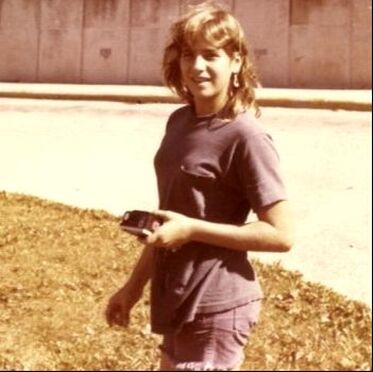 I was 12 when I crossed the Rocky Mountains with my family for the first time. I left behind family, friends, and wild minds that had buoyed and encouraged my fledgling voyage into adulthood. The long trek from east of the Mississippi, made in our white 1973 Chevy Suburban, and instigated by my dad’s new job, was an adventure for me. I loved every minute of it. Long before the internet and the easy escape of smartphones, I simply watched from the backseat window as the world slowly changed from deep green to brown, and the sky appeared to grow larger and more dramatic with every mile we drove. We arrived sometime in late July, not long before my 13th birthday. I had never seen a place so brown and pink before; not in real life anyway. My dad was in heaven, my mom not so much. My memory is that she cried when we arrived. As for me? The jury was out, and it took about a year before I realized just how much of an alien I actually was in this new home. But in that first summer, I was open and really quite excited by the high altitude and dry, dry air. We slowly settled into this strange place. It was so small in comparison to everything I had known before and I remember thinking that it was like living in my favorite show at the time, Happy Days, a 1950s-style show where girls were girls and boys were boys. These roles were very clearly defined in this new place and it was foreign--my first move to a foreign country. I had long been an athlete and tomboy and even though I had recently changed into a woman, in my heart of hearts, I was still the super physical tomboy I’d always been. We lived in an apartment when we first arrived and the only thing I remember about the place was that it had a pool and I rescued a little Siamese kitten from an abusive alcoholic who made him wear a costume jewelry bracelet around his neck as a collar; he could barely hold his head up while wearing it and it was staining his white neck fur green. I was appalled. The final straw was when, in a drunken rage, this neighbor threw the kitten into the pool and he was sinking on account of the heavy bracelet. I dove in to save him and took him home with me. My mom made me go to the neighbor's apartment and ask permission to keep him, which they were more than happy to oblige, and Tom became our family cat for 20 years. After the apartment, we moved into a mobile home park, which was actually a much better experience than the apartment, but I was acutely aware that something was deeply wrong here, but couldn't quite put my finger on it. I made friends easily so there were always packs of kids running from one trailer to another for the year we lived there. I had a strong sense that I spoke better and thought much more deeply about life in general than many of the people around me and I heard things said that were simply unacceptable in our home; racist and sexist things and so our time there was short-lived. When I reflect on that time I have a very strong memory of being invited to a friend's house for dinner and eating, for the first time, something called Hamburger Helper, and thought it was surprisingly satisfying. We eventually moved into a house on a good-sized park about a block from the high school I would eventually attend. But at this time, I was still in junior high and so begins the story proper. Prior to our move West, I attended a university middle school, where people of all classes, colors, religions, and lifestyles lived relatively harmoniously. Lots of funding for the arts, sciences, and critical thinking was encouraged. I assumed this was how all middle schools functioned. Needless to say, I learned quickly that this was not the case. When previously involved in theater, with productions presented on a big stage with real lighting and real curtains, my new school's stage was a little raised step-up in the cafeteria covered in a lime green indoor-outdoor carpet. I cried when I got home from school that first day. I had a teacher who made me sit on my hands because “nice girls” don’t talk with their hands and she believed I was doing it for attention. I laughed about it at the time, but deep down I experienced a profound outrage at this. I also quit singing at this time because, as a girl, I was forbidden to sing anything but alto or soprano and I am naturally a tenor. I continued to sing the tenor part until I was found out by the choir teacher's eagle eye and keen ear, and a sharp public admonishment about how a girl singing tenor is ugly and guttural. A painful end to my love of singing to be sure. There were many other offenses to my person by the "authorities," but these stand out as especially heinous for me at the time. I was really into hats, liked to change my hair, and wore vintage clothing, like the heather brown wool suit I had from 1933 that my great aunt had given me. Mostly though, I was loud. I laughed out loud (still do actually) and I spoke my mind loudly (mostly I still do, but that has been tempered somewhat by life). I was used to being different, but that had never been considered a bad thing before now. I think if it weren’t for the sheer force of my energy and personality, this place could have chewed me up and spat me out. What it did instead was forge my will into steel and I did make friends, some of them are still friends to this day, surprisingly. I was physically mature earlier than other girls my age. I had one girlfriend who was also an early bloomer and it was a bonding experience for us both. Our friendship smoothed my entry into the very segmented social scene that was this place, where I was surrounded by mostly middle and upper middle-class students. These are the families who had been in these parts for generations. It was a small, tight-knit community and they all skied, their families were often part of the country-club set, and everyone knew each other. I was an anomaly, or at least I was always treated as such. But I did eventually find a comfortable place in a circle of friends where I felt seen and genuinely enjoyed. Having transferred from a middle school (6-7-8) to a junior high (7-8-9), I was stuck in this weird liminal state somewhere between elementary and high school for a year longer than most. My parents were much stricter than many of friends’ parents and we didn’t have a lot of extra money, also unlike most of my friends, so I kept busy and out of the house through sports, babysitting, and “drama productions." It was during the 9th-grade year I fell in love for the first time. He was an unlikely candidate. Where I was physically mature, he wasn’t until later. Although my dad was now a geologist, he had been a construction worker before returning to school when I was in 5th grade and our family culture was working class (my grandparents were railroad workers and carpenters) and my mother always worked. I am what they called a “love child” and my parents married when they were still teens. To be honest I never really knew what this boy’s dad did for a living, but I know it afforded them a privileged life. I only met his mom once or twice and I didn’t get much from her except that she was a hard, judgmental woman, and most assuredly did not approve of me as anything more than a friend of one of his neighbors. Not that those things matter much to kids, all I knew is that I liked this person and I wanted to be around him to laugh, wrestle, and to be my loud and proud self with because he always seemed to enjoy me as much as I did him. I got the impression that he was raised in a serious home, or at least one where joking or teasing was often flavored with enmity, so that easy relaxed kidding that comes so effortlessly to me had to be, unexpectedly, navigated through at times. Anyway, that didn’t happen often, but it does stand out in my thoughts of him. Mostly, we laughed together. I have a very vivid memory of sitting across a table at school and the two of us just laughing; no words, maybe some silly faces, but there was a purity of enjoyment that has stuck with me for all these years. Even today when our quite divergent lives cross paths, within a couple of sentences, we are laughing. That holds meaning in my world. We loved to argue with one another, both in words and in body. We would wrestle like a couple of bear cubs and I always felt incredibly comfortable with him so that when, some years in the future, we crossed paths and our wrestling took on an adult expression, it was still as comfortable and enjoyable as those days at 14 when we’d meet outside for a wrestling match (which I usually won, of course). Perhaps it was the difference in maturity levels, but one day I woke up with the thought clearly in my mind that “Today is the day, I will ask him to ‘go with me.’” This was the parlance of the day for “becoming a couple,” or “going steady”—as steady as a couple of 14 year-olds can be. But it was very serious to me because it was the first time I felt compelled to say something along these lines. I'm not even sure when it all shifted from bear cub wrestling to something more "serious," but I was going to come out of the closet and state my love. When I did, after school that day, he yelled that “Girls aren’t supposed to ask! And No!” That was one of those moments when my previous world crashed headlong into my current reality and I can feel it like it happened yesterday, not 45 years ago. Isn’t memory strange? Other, much more important things have happened in my life since that day, but that sunny afternoon when I was rejected by the one I loved…well, the sharpness of the emotion has stayed with me. Particularly because the rejection was based on social mores, not the truth of the connection. Years later I learned that his rejection was based, in part, on the fact that his cajones hadn’t dropped, but it had a lot to do with the fact that I wasn’t playing my "role" as a female in this archaic town. I hated him for his cowardice and so throughout high school I didn’t talk to him but to say, “Fuck you,” until after we graduated. When next we crossed paths, we were both nearing 20 or so. I was living in Los Angeles at this time, soon to be moving to New York. It didn’t take much time before we were wrestling again, this time without clothes and with a fever I hadn’t really ever experienced with someone before, and that’s saying something because that was my area of study from 18-25. I had no shame—never have thank goddess—and had I known about the Kama Sutra in those heady days, I would have pursued it with wild abandon. Or let me rephrase that: I lived the Kama Sutra before I knew there was a name for it. Our paths crossed numerous times during those years, although we lived in different parts of the country. Email didn’t exist, nor did the internet, so there really wasn’t any way to be in touch besides writing or calling and neither of us felt the need to pursue that traditional path. There was something special about our connection, just for the two of us, and when we’re around each other, we are like moths to a flame. Life moved on and at 28, when our paths crossed again, he informed me that he was going to ask someone to marry him. I was shocked to hear this, but also not bothered by it in the least. That is the honest to god truth. My strongest memory from that night was not a disappointment at his life choice, but was sitting in the passenger seat of his car—a small goldish sedan of some sort I believe—and vibrating from his closeness. I remember asking him, “Do you feel that?” And his response being, “Yes.” It was like a magnetic pull. We haven’t touched each other since in the physical world, although he reached out to me when my kids were young (and his were as well) and we began wrestling again in the 5D and through the written word. We made plans once to meet up but it never materialized. While I was traveling in Europe for about 9 months a few years ago, reconnecting with my Italian family and seeing old friends, my youngest brother informed me that he was getting married and could I come back to the States for his wedding, maybe take some photos? When I returned to the states, I got an email asking where I was and that my friend was in Rome and could we meet up? I tell you, timing is a cruel master sometimes. I saw him this weekend at the funeral for a mutual friend. We sat across a table from one another, like we used to do in middle school, and argued and laughed like it was 9th-grade all over again. And then we parted ways. We gave each other a hug and his warm palm pressed deep into my back and lingered, for just a moment longer than is usual, and we said goodbye. I wrote him to see if he wanted to hang out and talk but he turned me down and I felt like I was standing on that corner on that sunny afternoon all those years ago. I have never written these things down but felt compelled to after yesterday. Perhaps it’s my way of closing a chapter that’s been the longest damn chapter in my life. Maybe I just don’t know what to do with my desire. Maybe I can use all the feelings to write about a love that has never been spoken aloud but has wrapped me in a vibrating glow since I was 14. It has inspired me and left me weak in the knees, made me angry and feeling ridiculous, helped me keep an internal fire burning. All these things, never spoken, but always a quiet knowing between the two of us that doesn't seem to diminish. 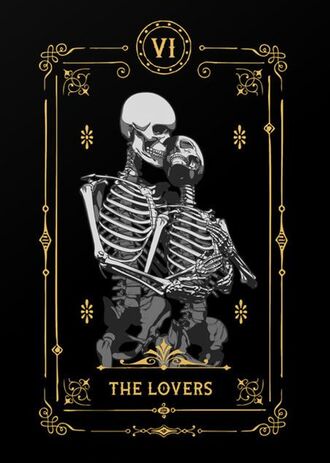 The Lovers tarot card (c) Grandeduc The Lovers tarot card (c) Grandeduc People here jokingly say things like, "Have you finally decided to grow up?" because, you know, being joyful and never having lost the spark of curiosity somehow renders one a perpetual child. My response is to shrug, "Probably not." I do know that I've come full circle in a chapter of my life's story. It's probably why my circuitous path has led me back to this place after originally fleeing from it. I needed to put this whole thing in perspective and make peace with the knowing that unrequited love is confusing. It's never as clear as stories and films make it out to be and can be both joyous and haunting. It's also not a constant, but is more like background music that is louder or softer depending on where you are or who you're surrounded by. Maybe it is constant, but doesn't require our attention all the time. I've gone years without recognizing it; years without so much as a thought of it. But with a mention of his name or the sound of his voice, the music comes roaring back to the forefront and I begin vibrating as if I'm 14 again. They say time is an illusion, that we are always everywhere at the same time; reality is beyond measure, beyond our feeble attempts to control it. I find, in my personal story that this is true, at least as true as anything else I've experienced.
Enjoy my experience of the 1980s.
https://open.spotify.com/playlist/5eTgQIRNavm3xEwA3u3zcY?si=kyrLSVA4R7e2jr1s9KE9Qg
My love of mixed tapes was reignited this past year, much to my surprise and enjoyment. I've made a few different ones over the course of this difficult year and they all strike a chord for me. Enjoy.
https://open.spotify.com/playlist/3EGVGAop2lR84LBFbapBpE?si=Z3IMFvn9TW6lG1bkEjL04g Nature never breaks her own laws. --Leonardo da Vinci It is said that life and experience are a continuum, never one thing or another, but rather somewhere fluctuating between opposites. I tend to agree with that assessment. However. How do junctures like these we currently find ourselves in fit within that paradigm? How do we account for periods where we are neither here nor there; caught in the liminality of a moment caused by, in the current iteration, a great social rupture? If you would allow me a brief dip into academese, Eldredge and Gould (1972), writing from a paleobiological perspective, described these reoccurring historical incidents as punctuated equilibrium ("geologically instantaneous, even if tolerably continuous in ecological time"; Gould and Eldredge, 1977). In terms of social systems and structures, group developments, and social policies, punctuated equilibrium has been explored as an explanation for sudden shifts after long periods of social stasis, which then lead to radical change (Gersick, 1988; Baumgartner and Jones, 1993; Givel, 2006). 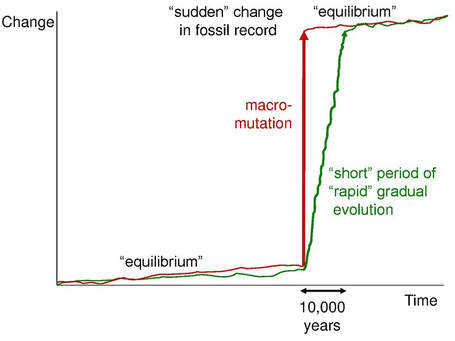 CC BY-SA 4.0 Ian Alexander CC BY-SA 4.0 Ian Alexander I find this lens to be especially potent during times like these. Maybe they help me make sense of a world spiraling out of control--not that we haven't been on this trajectory for a while--but January 2020 just might mark one of these periods of punctuation. Stasis, as it is described in the theories touched on above, is seen from geologic time (meaning constantly moving but very slowly; never actually stopping). According to Merriam-Webster, it is "a state of static balance or equilibrium," which assumes a generalized kind of balance--at least as seen from a value-free lack of social engagement or understanding. M-W's definition does not recognize underlying issues, challenges, or simmering rage to this apparent "equilibrium." Keeping that caveat in mind, I can use this as a basis from which to begin. About a month ago I moved back to the place I lived for four years, forty-one years ago. Those four years happened to be the years of high school, so strong memories and stronger friendships were forged. I left my home of twenty-five years in Oregon, where I fell in love, birthed and raised two kids, and earned a doctorate. I had never lived anywhere in my entire life longer than I did in the Pacific Northwest, and it very much feels like my home now. I absorbed and digested so much in Oregon. I've made friendships that will be with me forever, and I've learned lessons that might come in very handy in the next couple of years; things like gardening, fire-making, reducing and reusing resources, and living with very little (to name but a few). But the high desert called me with a power I could not deny. So, here I am in a place that also feels a bit like home, one that was mostly disliked during the time I was here before and was fraught with challenges to my person. The girl I was then was not thwarted by these clashes of perspective, but rather empowered by them. I'm undecided how I am reacting this time, as this time is very different indeed. For most of the last month, I have been sheltering in place (as they're calling it)--since about a week and a half after moving back--as a result of the global pandemic known as COVID-19. The temporary job I had lined up has been frozen, as well as all my new-hire paperwork for my fall position at the university. Everything simply stopped. Thankfully, a good friend from those high school years--her two kids now grown and moved out as well--had plenty of space and offered me a room. Initially when I moved here, we thought this would be a temporary situation until I had paychecks coming in and could find a place to live. Little did we know that we would be spending 24/7 together for the first time in...well, forever. For two people who have never spent more than a solid week together--however sympatico and comfortable we've always been with each other and however long we've known each other--it's still a challenge. Our politics are quite opposite and this is a point of contention we have to navigate constantly. We usually meet in the middle and agree to disagree, but there are moments when that's not easy to do. The truth is, I haven't watched television for twenty years, deciding that I did not want my kids to grow up consuming advertising's toxic messages, so we disengaged from it. Movies were fun, but that's a very different experience to mainstream television. My friend likes the sound of TV. She uses it as background noise when she works. I can appreciate this, but I do not share her experience. I like silence or music. So I've been listening to and watching TV more than I have in a very long time and it's contributed a level of surrealism to this experience that I couldn't have foreseen. I've entered the Twilight Zone. So we've made compromises. We enjoy mostly similar movies, so our evening viewing has been easy and fun. I've turned her on to Law and Order (yes, a guilty pleasure of mine!) and she's shown me Brooklyn 99 and we laugh like it's 1979. She likes Fox News, I like anything but. I have started watching Tucker Carlson with her and immediately follow this by Rachel Maddow, which for both of us is easier and more painful than we thought it was going to be. I find them both to be smart but incendiary. It's been like a ping pong game inside my head, as I cannot help but hear the absolute propaganda of both individual's platforms. Neither seeks to see both sides or to build bridges in this time of chaos and need. At times, both are doing a disservice to the millions who watch them. In this time when our 300+ million inhabitants need to rally and help one another through this crisis, two of the biggest voices on either side of the spectrum are telling truths AND lies. I suggested we listen to PBS Newshour, Democracy Now!, BBC News, anything to combat Carlson's sly white supremacist lies. I mean, if I hear him slander identity politics one more time I think I'll scream; that by mentioning anything that is not white and Christian we are somehow anti-American? No. That's just old school racism and white ignorance masquerading as patriotism. On the other side, we have Maddow's regurgitation of the same facts and the same blame game as seen through a liberal lens, which is getting us nowhere right now, quoting nothing but the New York Times, as if it is the only valid news source out there. I'm sorry, but there is more to the United States than New York (and for the record, I lived in NYC for most of my 20s and love the place; my heart grieves for those suffering from this crisis). Many other places are suffering about as much as New York without the representation our beloved Big Apple receives. In my opinion, if you want to reach those who might not be in your camp, stop ignoring them and look outside your urban centers to actually communicate with the rest of the country. The bottom line is that both sides are incapable of hearing what the other has to say and this is not news to anyone right now. What is new, is the inability to pull together as a nation in a time of crisis. If this is, as the president has proclaimed, a "war," then our atomized nation is fucked. Are we even able to rise above our differences to combat this together? I seriously don't know. The absolute schism of this experience has my mind a little shaken. 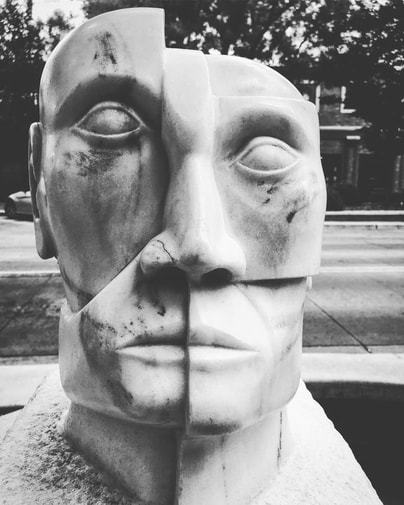 "Head in Progress" by Michael Ford Dunton. Photo by the author "Head in Progress" by Michael Ford Dunton. Photo by the author In addition to this ideological war being waged, I just can't shake a small, insistent voice in my head. I've had a fear for a couple of years that our current government would do all it could to keep power; that something would happen, or be created, by the 1% in order to prevent the American people from voting them out come November. It would be a war, or some kind of crisis, where the president would invoke the War Powers Resolution and then all hell would break loose, leaving us in a downward-spiraling maelstrom that sucks us all under--something akin to what happened to Germany in 1933 with the Reichstag Fire. "Heaven forbid!" I keep telling myself, but I have watched a slow progression into absolute control over our lives and livelihoods. I know what you're thinking, "Mickey! Chill the fuck out, girl. This caught the whole world off-guard." And I wouldn't disagree with you. BUT, it's how it's being responded to and used by those in power (and their propaganda voice pieces) who have something to gain that I find unsettling. No need to go into a conversation about billion dollar bailouts (again) for large corporations or the fact that everyone I know who has applied for unemployment (and are part of the current 10 million other unemployed Americans who've also applied) have not received any money or even a response. Landlords want their money. Credit card companies want theirs. We are being crushed under the weight of this crisis and have no idea when it will cease. Other countries have halted rent and mortgage payments, all medical costs (including any insurance payments), and have ordered a universal minimum wage during the pandemic (not a one-time payment of twelve hundred bucks), which are signs we use to measure a civilized society. But not here. It's more important to save shitty airlines that have, over the last twenty years, made flying a hellish experience in order to maximize profits, but it's not okay to make all medical services free of charge and put all rent, mortgage, and credit card payments on hold until this passes and we get back to work. I've heard the arguments that by saving the corporations, we're saving tens of thousands of employees' jobs because this money will help the companies keep them on the payroll. I also understand that oversights have been set in place so these corporations cannot buy back their stocks like they did in 2008. Nonetheless, I have a very unsettling hunch that something nefarious is happening and it is growing into a genuine existential dread. We are in a global low tide at present and I fear a tsunami is heading to our shores, one with the potential to wash away all that we've come to recognize as modern society. 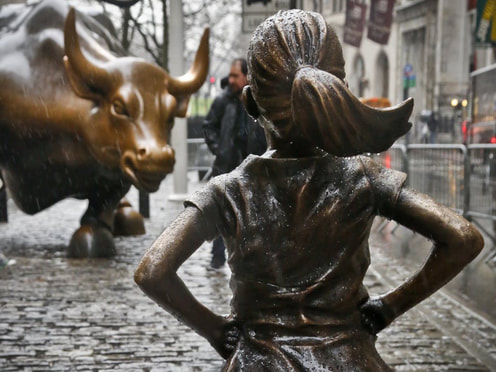 Source: KEYSTONE/AP/BEBETO MATTHEWS Source: KEYSTONE/AP/BEBETO MATTHEWS Whether you see our current predicament from the right or the left, I think most of us know deep in our gut, that things have been wrong for a while now. The United States, along with most of the world, has been cracking under the weight of the global financial system as it has slowly been taking over every aspect of our lives while it has catapulted the 1% to soaring heights. Maybe the silver lining in this whole thing is that if there was any doubt before this crisis, very few people remain who cannot see what is now crystal clear: we the people come second to the power of capital and unless we use the enormous strength of our numbers and sheer willpower to resist, we will sink deeper into the Big Pharma-infused stupor of consumption and debt slavery. So, here's to America. May we shake out the cobwebs and say, "No more." #coronavirus #covid19 #resist #punctuatedequilibrium 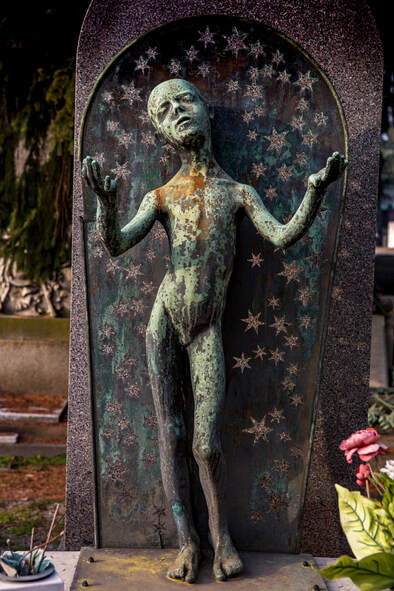 Cimitero Monumentale di Milano Cimitero Monumentale di Milano I never really came back. The ties that bound me here were neatly unraveled and cast to the four winds before I left. After twenty-five years in the same place--a place, I might add, that I have loved and considered home--I packed up, said my goodbyes, and boarded a plane to destinations unknown with nothing but my camera, computer, some clothes, and a small savings. As I started to find my rhythm again on the road (it takes a couple of months to slide into and it had been a long time) and I was locating those cities, people, and organizations I wanted to be affiliated with, I was pulled back by those unseen forces that defy logic a year later (or thereabouts). I am here, but seemingly a ghost that only a few can see now, holed up in my burrow, awaiting my next departure. Neither here nor there, all dressed up with nowhere to go. There were reasons to come back. I didn't know them then, but they revealed themselves fairly quickly to me and I have no regrets on the decision to fly back across an ocean to be here. On the contrary, I'm grateful for the tides that pulled me in because I needed to be here for things that were taking shape, unbeknownst to me at the time. Life is funny that way, particularly when a knowing is just under the surface and one's decision doesn't quite have the factual backing to warrant the choice. Truth be told, I've lived a lot of my life that way, but it's been a while since it involved moving and I suppose I've forgotten the feeling of it. Twenty-five years is a long time. In fact, it's longer than the lifetime of my kids, who are the primary reason I stayed here as long as I did. I've learned so much here. I am a very different woman than I was when I first stumbled into town, not knowing a soul but had been compelled to come during another of these "knowings." I left New York that time, when I knew it was time to leave everything and everyone familiar in order to journey to an, as yet, unknown location. I followed the "signs" and they led me to this place. This place. I miss many of the basic things I almost take for granted here when I leave: access to good, local food (that we can grow ourselves--and most of us do in some capacity), water (and lots of it), a social and global intelligence that even our kids possess. We, here in this valley, lead the country in breaking down archaic structures and systems of control, and yet a monocultural vacuum has been created where all these beautiful, systems-changing successes feel forced into a very constrained channel, or mode, of expression. And like most places in this part of the country, the average citizen, artist, or magician is being priced out. The city gave massive tax breaks to huge corporate entities to build here in the hopes of overcoming a serious housing shortage a few years ago, and build they did--for the thousands of out-of-state students flooding into town to attend school here. The hundreds of new apartments go for upwards of $1,000 a bedroom, so you do the math. A single mom with two kids living on $2,500 a month is, to use an old phrase, shit out of luck in the new financial climate of this fair valley. When I moved here, I paid $145 for a one bedroom flat. Yes, you read that right and, yes, even for this place that was a seriously good deal, but deals could be found then. It rained from mid-October through mid-June, which was a deterrent for any but those who really loved what this place had to offer. Trust me, that first winter was tough, but the payoff was that period between the summer solstice and mid-October when we didn't see a drop of the wet stuff. Our weather is changing rapidly and it has become more like northern California, back before it started to feel like southern California; undoubtedly, climate change contributes to the massive influx from our southern neighbor. 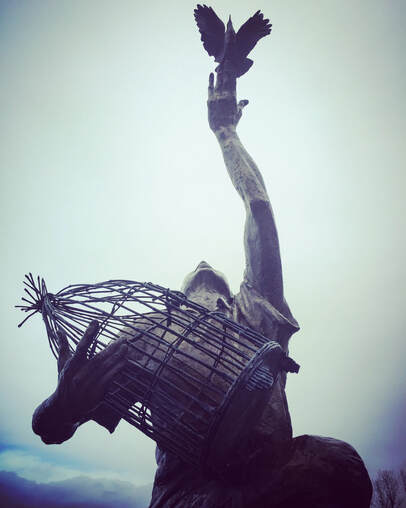 Sculpture at New Hope in Eugene, Oregon Sculpture at New Hope in Eugene, Oregon Liminal spaces are always unsettling. Both exciting and terrifying depending on the moment, this place I've been inhabiting has, nonetheless, caught me off-guard because I didn't expect to be so utterly severed from a place I've lived for so long. I assumed I'd just come back and, I guess, pick up where I left off. But those ties I let go of a year ago really were for keeps. Those people I have been closest to don't seem to be connected to me any longer and I stand alone now. That's a mixed bag emotionally speaking. It excites me on the one hand because it reminds me that I am actually moving into a new chapter, albeit a little more slowly than I had hoped. It's also quite unsettling as I realize just how fleeting personal connections can be. We never lose a heart's memory, but we do lose the trusted immediacy of them. Not that it's a surprise really, but it happened faster than I had expected after so many years' bond. This place has taught me that closeness is a gossamer dream, easily eclipsed by the winds of change, cherished and remembered but never to be held. It also shows me that I had some loose ends to tie up, ones that I overlooked in my haste to be free. I am nearly there. I may be dragging a little energetically speaking, but life's timing cannot be denied, even when we think we control it. So here I sit, watching the seasons change; crossing my t's and dotting my i's, alone but strangely content in the knowledge that if I continue to listen deeply the path ahead is assured. It hit me immediately, a kind of muddy feel in the air, fraught with anxiety and anger, a resignation mixed with boredom. As I looked out the window of the rickety train, moving along at 19th-century speed, I knew I was back. Riding through the Northwest, south to my home in Oregon, I was interrupted occasionally by the drunk woman across the aisle talking loudly on her phone in what I perceived to be a desperate attempt at avoiding herself. I noticed how few people were smiling or even seeing the beauty passing by our windows. One young woman smiled at me and commented on my nose ring (to be honest, it felt like 1985 for a moment because, I mean, they're as common as earrings now, aren't they?) but, besides her, there was a somber quality to ride.
No, this was a country in crisis and it was palpable. While waiting for the train in Seattle in a lovely--yet strangely empty--rail station built in 1906, I just sat there in my jet-lagged stupor and watched people. You could see the weight of the last year in America bearing down on everyone, stoop-shouldered and bland so they became a blur of earth colors, interspersed with florescent green or orange. I had been drinking coffee to keep me going on my journey home, so sleep was not going to happen, even if it had been more than 24 hours since I woke at dawn in a comfy bed just south of London. With the exception of a couple of people since arriving home, this feeling of anger and sadness in those around me has continued. Maybe I'm more sensitive to it right now. Months with minimal exposure to the spectacle (horror?) that is American politics right now has been a salve to this poor sod's soul. Maybe we're just losing our collective mind. Whatever the cause, it's downright frightening. About a week before I returned, the Parkland, Florida school shooting had occurred and our youth had started what I believe to be the tsunami headed our way. Failed by the adults running things, "adults" who have utterly failed them, they have begun to speak for themselves, are registering to vote as soon as they turn 18, and are walking out of schools in droves. Good on 'em. I, and many of my friends, have felt we were living in a Twilight Zone, yelling into the wind, our voices lost in the brain-numbing hurricane of the corporate behemoth now running this country. And the kleptocrats are playing the long-game, have been playing this game for a very long time. Although by no means the beginning of this trajectory, when it became public knowledge that Ronald Reagan was in bed with Jerry Falwell and the Moral Majority, I had a nascent feeling that things were taking a turn for the worse. When they all but disappeared from public discourse around the time of Clinton's presidency, I knew they hadn't gone away, but had instead gone underground, drawing out the blueprints for a plan that has led to our current "situation." Compound this with the growing power of corporations (read: Citizens United, Big Pharma, Big Agra, etc.) and the complete destruction of public education, you've got a perfect storm of greed, ignorance, and religious fanaticism. What we have now is an over-medicated, under-educated, consumption-focused population too over-burdened with debt to do a damn thing. Most of my generation (and the previous one) are lost and many of them have raised children who are following in their footsteps. But thanks to changing technology and a growing awareness of my generation's (as well as that of my parents') failure as stewards of this planet, our youth are stepping up their game and saying ¡Basta! The racism we are so aware of now is nothing new. It's an integral part of America since the first whites invaded and colonized this land. What is new is our public discussion of it, our ability to share that information, and to build networks of resistance against it. It may be hard to imagine as things are, but the time of those Americans aligned with white supremacy and corporate greed and who are emboldened by the current climate is ending. It will take more time than is comfortable and it's liable to get worse before it gets better but, in case you hadn't noticed, time is moving much more quickly now on account of the rapid flow of information and those of us working for justice are being heard louder and clearer than ever. This gives me hope in a time of chaos. BAVENO It’s not like I expected it to be easy. Quite the opposite really, but I never thought I’d come up empty-handed. Yet empty-handed I am. It’s as if when they left Italy, all traces of my maternal bloodline vanished, lost to the mists of time. This has really got me wondering why they left—my gut says it was more than the desire for work—and why, once settled in Pennsylvania, they never spoke of their past. Why did my great-aunt decide to tell me of our “secret” Roma roots? And why, for god’s sake didn’t I ask more questions before she passed? I’m kicking myself for this oversight and lack of focus when I was younger. May my experience be a good lesson for those of you who are bestowed with a family secret: ask more questions, immediately, and even better, record their stories while they are alive. I’ve had to make peace with the fact that my original plan for traveling to Italy only half materialized; not necessarily an easy thing for someone who nearly always accomplishes what she sets out to do. The door remains shut on my maternal bloodline, although I did find the village where their last steps on Italian soil occurred, walking them myself, or at least breathing the same mountain air, drinking the same water that still flows from the ancient mountains that surround Lago Maggiore, and lit a candle to them in the 12th-century church where they undoubtedly prayed to the Mother. 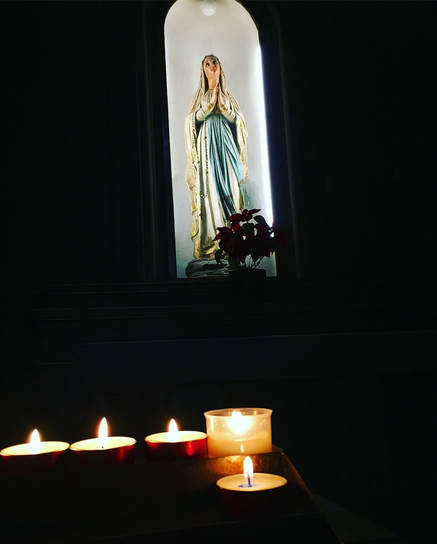 Candle lit to my ancestors at the 12th century Church of the Saints Gervaso and Protaso Candle lit to my ancestors at the 12th century Church of the Saints Gervaso and Protaso Baveno is one of a handful of small towns and villages that encircle the lake, one of many in the “Lake District” of northern Italy, close to Switzerland in the north and Austria in the east. Lago Maggiore, the lake upon whose shores Baveno sits, is partially in Switzerland and is the second largest lake in Italy. These Italian towns and villages have more in common with their northern neighbors than in the south and I found the people more reserved and less helpful than I did in other parts of the country. This may have something to do with the weather or simply the influence of the Swiss; I didn’t get to spend enough time to know for sure. But it is beautiful, gorgeous in that storybook kind of way, with low January mists hanging in the foothills of the Pennine, Lepontine and Lugano Alps and the vast lake with three Borromean Islands named after the Borromea Family who acquired them in the early 16th-century. I visited the Comune di Baveno, the local office for everything from paying bills to public records, looking for the names of my great-grandparents: Bruno, Durante, Pais. I searched online records, I wandered the town cemetery, looking for these surnames. I found a few Brunos and intend to look more deeply into the name, as the woman at the inn where I stayed said it was a local name. The other two she did not recognize and the lack of even one Durante or Pais in the graveyard supported this. My instincts tell me that Pais and Durante must be the Roma/Sinti bloodline, so I will follow this inquiry when I return to Oregon. It will also be helpful to stay longer than I was able to this time—three days is just not enough time —so that brings me to the half of this journey that was fruitful. CONTRONE My paternal bloodline, in the southern Italian region of Campania, opened their doors and lives to us. I traveled to Controne with my son and my brother, a year and a half after my daughter found her way there—at my suggestion—as part of a backpacking trip with a friend. No public transportation can get you to this small mountain town, so she and her friend took a cab from Salerno. It’s about a 35 mile journey straight up into the mountains from the beautiful area where the Amalfi coast ends in Salerno. The small piazza in the center of town can be filled with men of many ages but the women don't frequent the square during the day, although at night I noticed a few younger women hanging out with young men. But during the day, it’s mainly a boys club. I can only imagine the reactions of the men when my tall, blonde daughter approached the square looking for Stellavatos. No one spoke English and she didn’t speak Italian, but there was a man who had worked in Portugal and my daughter had lived in Brazil, so they were able to converse in Portuguese. Eventually she was connected with a man in the village who spoke English. He had lived many years in Arizona and his wife was American, so this couple took them under their wing and both knew the Stellavato-Campagnas (some of our Stellavato relatives have married into the Campagna family). Interestingly, the couple who connected my daughter to our bloodline was a Vecchio and they had, all those years ago, immigrated to the States along with my family, but the Italian knowledge of this had been lost. They both bought houses on the same “hill” in Washington, Pennsylvania and many a family gathering of the two families have occurred during my lifetime. (I feel I should also mention the Faellas as well, as they immigrated from Campania at the same time as my bisnono and my godfather is a Faella—they were all farmers together before they left their homeland, although I didn't meet any while there.) Controne was like a paradise, sitting at the base of the “Dolomiti Sud,” as the locals refer to them, or Southern Alburni Mountains, with the River Calore, rated as the cleanest river in Europe, winding its way down the mountain and through the village. Twenty-two natural springs feed into the river, as well as the many stone fountains located throughout the area. Campania is known as Oil and Bean Country because 80% of the area are olive trees and they grow a small, pearl-like bean known as the Piccolo bean, a creamy and delicious bean they prepare in a thousand different ways, all incredibly good eats. My cousin took me on a tour of his bean, olive, and grape fields (they grow a Barbara grape) and I am happy to say I brought home a pod of four beans that I will lovingly grow in my Oregon garden. Truth be told, I did not want to leave. I felt comfortable there. It felt like coming home. 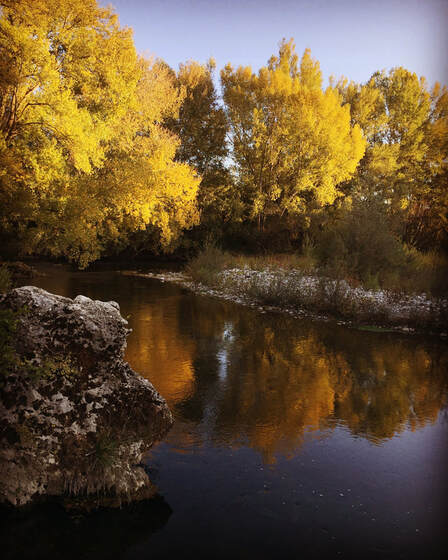 The River Calore in all its autumn splendor The River Calore in all its autumn splendor I have now nearly everything I need to apply for dual citizenship. All that's left are the international notarizations of the U.S. documents, known as apostilles. These are easy to come by and, like most things American, all you need is money to obtain them. This is the next step when I get back to the states as you must apply from your resident country. I hope to return to Controne, to watch the seasons change and get to know my Italian family better. They laughed heartily, fed us to bursting, and made us all feel welcome. We invited them to come and visit us in the states so that we might return the wonderful hospitality they showed us. I'm not sure Oregon excited them as much as Las Vegas did, where my brothers both live and teach in the public school system. Las Vegas made them smile and I wouldn't be surprised if they visit my brother. When you live in paradise, the paradise of Oregon isn't quite as appealing as the neon empire of Las Vegas might be. It's ok, I can understand the appeal. Whichever way it goes, I look forward to our next encounter and building a bridge between the our two branches of the Stellavato family tree. An interesting side note: They say if one member of a family dies and another is born within the same year, it is the soul of the one who has passed that enters the new life. If there is any truth to this, my great-grandfather, Giuseppi-Niccola, the family member who immigrated from Controne to Pennsylvania and is the basis for my citizenship application, died in March of 1961 and I was born in August of 1961. Perhaps Giuseppi is trying to get home… 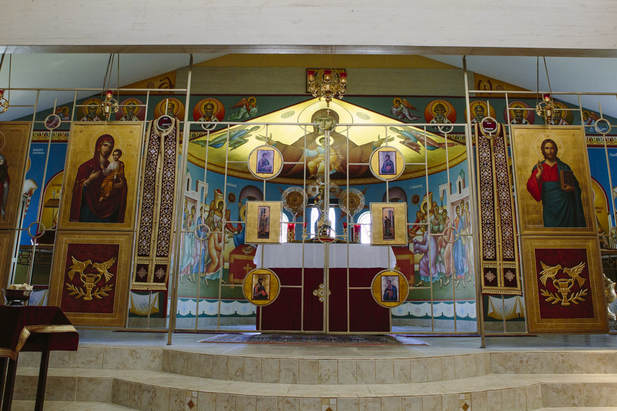 During these travels, I have renewed my enjoyment of swimming, energetically speaking, through rivers, oceans, and seas unknown nor consciously chosen by allowing circumstances to guide me. I’ve been traveling this way for six months now, commencing with a loose plan and one-way ticket. I left Oregon at the end of July, headed to Western Colorado and the summer monsoon rains, where I recorded the life stories of Greek Orthodox elders. These gave astounding insights into a high desert community where the Greeks (along with Italians, Bulgarians, Mexicans, and African Americans) were considered outsiders by the dominant culture of the White Anglo-Saxon Protestants. One woman I spoke with, whose father was the first Greek man in Grand Junction, told a lovely story about how the Greeks, Italians, Blacks, and Mexicans, who all lived on the “other side of the tracks” played and ate together, a multicultural childhood where the only real enemy was the racism they faced from those white Protestants on the other side of the railroad tracks. I was surprised how the elders never really called it “racism” or bigotry, but rather it was the subtext, unnamed, and merely dealt with as they worked their way to better situations. Many of the Greeks in the intermountain West travelled there to work in the mines of Utah and Colorado, eventually saving enough to buy land and livestock, sheep primarily, and grew great ranches in the high desert region of this area. The church was their anchor, the community center point, and their protection against those who would exploit and exclude them. These stories and accompanying portraits inspired me to expand this idea into a larger project, tentatively entitled Faith, where I will gather stories and portraits from other faith communities west of the Rockies. I find their stories fascinating, particularly as a way of community-building amidst exclusion from the dominant culture. 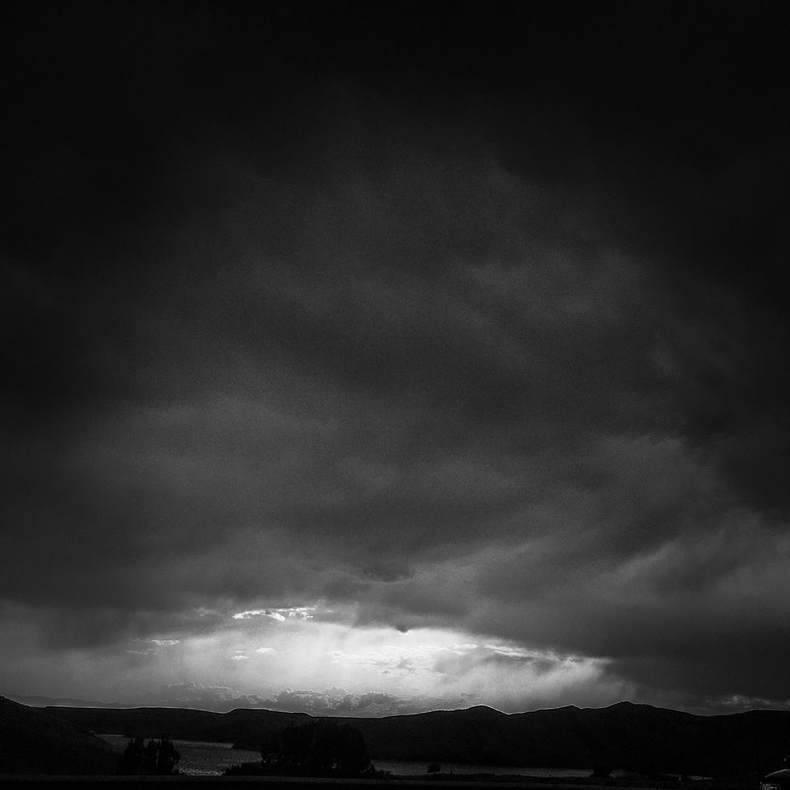 Following the week-long story gathering, I headed to the desert and mountains in northern Colorado, Utah, Wyoming, and Idaho where it rained. And it rained. And it rained some more, just in case I had missed the point. I write that lovingly now but trust me, camping in the rain—and not some light drizzly rain like we have in Oregon most of the time, but drenching downpours accompanied by 40mph winds—is a real challenge when all I wanted was to commune with the wind and sun. Reflecting upon it now, I do believe I was simply exhausted from years of work with almost no breaks. Years of struggle, both existential and financial in equal amounts, and I needed to sleep for a few months in total isolation. Like the bear paw tattoos that adorn my shoulders, I was in need of deep hibernation. My journey since then has supplied this much needed rest. An interesting and unexpected observation I’ve made while traveling is that now, as a middle-aged woman, I slip through passport control much quicker than I did as a young woman. This is a distinct advantage I hadn’t considered after years of remaining stateside. I am no longer considered a potential threat to any country. I suppose my greying hair marks me as a settled individual, content with—or at least resigned to—my circumstances, whatever they may be. I find this strangely funny. I also find this disturbing on quite a few levels. The assumption that, as a woman ages, she is no longer capable of radical acts is patently false as well as offensive. It’s also thoroughly enjoyable on a pirate, “fuck you matey” level. I could be a walking revolution and they would just pass me through because I’ve got grey hair and wrinkles. It’s quite nice not being grilled about where I’m going and for how long. Now it’s just a “thank you madam” and “have a nice day mam.” Except once on a bus from Paris to London. That crossing was like the old days: "What are you doing traveling around? Do you have a job?! How much money do you have? Where is your return ticket?" A long, uncomfortable silence after I responded, "I'm traveling because I enjoy it. I'm visiting friends and watching people's pets, I'm taking photos, I'm reconnecting with family. No, I do not have a job right now. I don't have a lot of money, but I have a check coming in ten days..." He gave me that officious stare that only government employees can have and finally stamped my passport for a (second) six month stay in the UK. Do not enter the UK via bus--even though on certain lines it can be less than half the cost of a train and there are no real weight limits for your baggage like when flying. I suppose the fire of youth has been tempered somewhat by life’s mighty hammer—tempered in the forge of life, so to speak—but my iron will is stronger than ever so if I was to do something radical, it’s more likely that I’d do it now than when I had my entire life in front of me and the thought of imprisonment (or worse) seemed a right waste of a life. I suppose I was a bit more mouthy when I was younger, or at least more likely to say what I’d still say today, but in a louder and more ferocious way. Now I can keep my cool when I’m upset about something (guess I did learn something in grad school: "don't get emotional, use your emotions to drive the research and let the facts prove your point." Thank you, Dr. Curtin for always simplifying everything and making such sense). In the past, I often felt like a roman candle with a wick halfway lit most of the time. I have much gratitude for my friends who would tether me when needed. I’m also grateful for a generally laid-back take on the world, a live and let live mentality that is, for the most part, fairly low maintenance. But please don’t cross me or mine because then all hell can break loose and the banshee set free. That thought reminds me of a story that happened about eight or nine years ago. I was in grad school and the kids were about ten and twelve. We lived in university housing—a great old house near the university with rent more than half the going rate in that neighborhood—with two cats and a funny little dog. Next door lived another grad student with two ferocious dogs—one of them a pit bull that had been neglected and the other a black hound from hell; it had been a much-discussed worry of most of the neighbors on the street as to when something horrible would happen if either of those dogs ever got out. They would hang out the front window of her house, barking and snarling at everyone who walked by. In any event, something did eventually happen but thankfully the owner was home when it did.
Two friends of my kids, both aged about twelve, had been hired to mow the neighbor’s backyard, a common summer job for boys their age. As one of them waited to be paid in the enclosed backyard, talking to my kids over the fence, the aforementioned pit bull just snapped and attacked the boy waiting to be paid. He was a big, buff pit bull—large for his breed—and knocked the boy down. Luckily (well, that’s a relative term in this situation) for the boy, the dog attacked from behind, so he went face down on the ground. I believe this saved his life as the dog could not get a mouthful of his throat. The dog scratched at his back, snarling as he tried to bite the back of his neck. My kids were screaming and the woman came running out and jumped over the dog to straddle it. The boy was on the ground, the dog on top of him, and the woman standing over the dog. She grabbed the dog from both sides of his mouth and pulled back with all her strength. This released the dog’s jaw long enough so the boy could get up and away. The woman screamed “RUN!” and I was there to meet him as he got out of the gate because I had seen all this from the mudroom of my house where I had been cleaning and stopped when I heard the screams. This mudroom had windows on three sides and it afforded a complete view of the good-sized backyard and about half of my neighbor’s yard, so as the dog attacked, I grabbed a baseball bat—of which there were many at the time since my son was a baseball player—and ran out the back door, prepared to crush the skull of the neighbor’s dog in order to keep him from killing this boy. My kids later described me as looking like a banshee running out of the house, long hair sticking out in all directions screaming "I’m coming!” with a baseball bat held high. Luckily, I didn’t have to commit my first murder and was there for the boy to fall into instead, who broke down sobbing in my arms as his friend ran home to get his dad. He had large gashes on his back and neck, but luckily all his arteries and digits were intact. His dad reported the attack and the neighbor was required to quarantine her dog at home for 10 days to make sure he didn’t have rabies before being euthanized (the common practice for dog attacks I learned). During that time, she cried to me numerous times about how she had had her dog since he was a puppy and loved him so much (I always wondered why she neglected him so terribly if that was the case) and she was completely distraught that he would have to be put down. She never, not once, apologized for the attack but instead blamed the kids for “spooking” her dog. She ended up moving in the dark of night from her house on day 8 of the 10-day observation period, never to be seen again. To this day I fear that her dog eventually killed some child in Portland where she had said she would be moving. The boy who had been attacked eventually became a drug addict and, the last I heard, was living under a bridge in Amazon Park. My neighbour would never know this outcome of course but I still sometimes wonder if her carelessness and denial contributed to that terrible summer afternoon that left my kids’ friend irreparably fucked up… 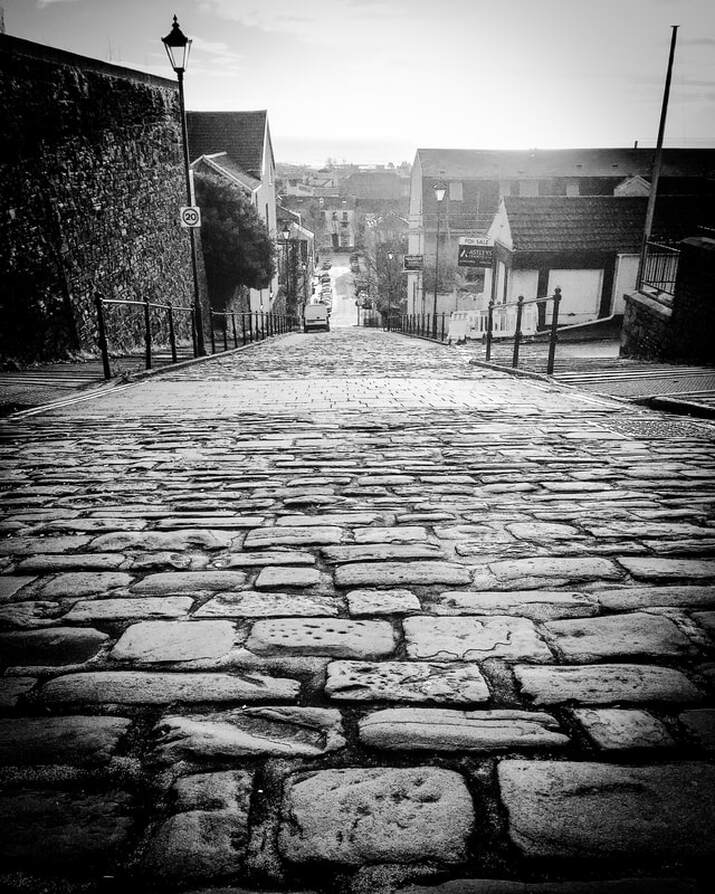 Constitution Hill, Swansea, South Wales Constitution Hill, Swansea, South Wales The lovely city of Cardiff sails past me as I ride a bus to London from Swansea, South Wales. I’ve been in the Swansea valley for about a month now…a city that gets a bad rap, like Liverpool or Pittsburgh used to before their rebirths. Industrial cities all three, abandoned by the national power structures but alive with people resilient, robust, and with scorching wit. Swansea, or Abertawe in Welsh, is the only one of those three that hasn’t quite made its resurrection but the heat and fire are rising and it’s only a matter of time now before the great phoenix wings explode into bright, soaring heights. Needless to say, I loved it there. Swansea is filled with music and the energy of artists—always the first to plant the seeds of growth and renewal in abandoned locations. I’m reminded of the call to action, “Plant Seeds and Sing Songs.” Like Oregon, I found a comfortable intergenerational rapport there and one always found time for a cup of tea and a few laughs. This was true everywhere I went in Wales, north and south, where magic is afoot and the old ways are just under the surface. Or in your face, fierce and beautiful. In the north one senses a razor sharpness even as everyone around me spoke soft and lilting Welsh. The North Welsh are very clear about not being English, whereas in the South there seems to be a more blended acceptance of the English. I also never heard Welsh spoken while anywhere in the South, although I know there are Welsh speakers there. But not like in the North where it's the first language. It's been in this latest generation where Welsh has really been reanimated, with nearly all schools in the North teaching in Welsh, which is compulsory for all state-educated students from five to sixteen. This has revived a language all but lost to the English domination of the area when, in the early 15th century, the last Welsh rebellion was stamped out by the English and the Welsh language was forbidden. This was more or less upheld until the Welsh Language Act of 1993, where it was established that "in the conduct of public business and the administration of justice in Wales the English and Welsh languages should be treated on a basis of equality" (Welsh English Language Act 1993, 21st of October, 1993). The early rebirth of the Welsh language is dated to about 1880, but the first seat in Parliament wasn't held until 1966. Welsh millennials and those who have come after them tend to be Welsh speakers now, particularly in the North. In any event, I was inspired by the ongoing determination to reclaim the original culture of the Welsh through language and traditions. 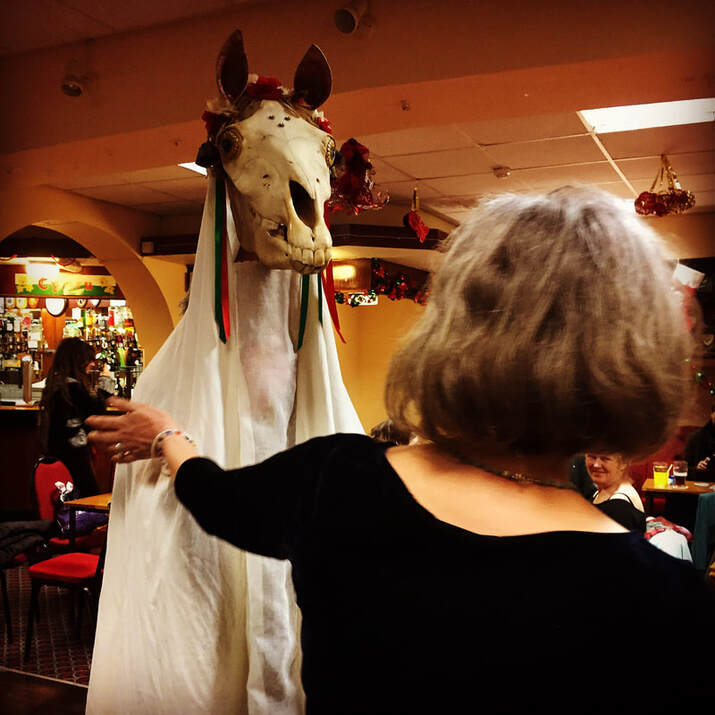 Mari Lwyd, St. James Social Club, Swansea, South Wales Mari Lwyd, St. James Social Club, Swansea, South Wales One such tradition was the The Mari Lwyd (Old or Grey Mare), with her skull bare to the moonlight she makes a midwinter journey, going from door to door, bringing fertility and good fortune to the community. The church all but killed this wassailing tradition that occurs between Christmas through to Twelfth Night but it lived on in the Swansea Valley and is being rejuvenated throughout Wales. The Horse pre-dates Christianity and can be connected to the Gallic Epona, the Irish Macha, and the Welsh Rhiannon, goddesses whose realms are healing, fertility, and death. I was fortunate to be at a gathering on Twelfth Night when the Mari Lwyd made a visit to the gathering for three friends who shared a birthday, bringing with her good tidings for the year. She danced with us until the social club kicked us out and I, for one, felt the old ways meld with the new in a beautiful fusion of light-heartedness and serious magic. I think this combination of playfulness and seriousness is what I find most captivating about Wales. Freedom from an oppressive system using ancient methods, like returning to the source. I like that and seek to integrate this wisdom into my daily life. 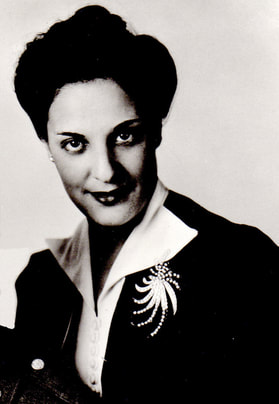 Edith Pais, my grandmother, daughter of Evelyn Bruno Edith Pais, my grandmother, daughter of Evelyn Bruno Zingaro. Gypsy. Sinti. My maternal bloodline grows from a long line of travelers; forced from their homes through slavery; refused settlement, citizenship, or even human status. In fact, I had no idea we descended from the Hindu Kush and anyone with any information has long since passed; the family story long lost to the winds of war and family secrets. I’ve decided to find what family still exists and document my process of finding the bloodline Bruno, last European location: Baveno, province of Verbano-Cusio-Ossola, part of Piedmont, Italy, on the west shore of Lago Maggiore. Let's say these words written here serve as a contract with my ancestors. The path that brought me here has been in the making for more than 20 years, based in portrait photography and oral history and guided by a solid foundation in research and collaborative methodology. This path has been a circuitous one, lost and then found again through my paternal bloodline and the process of working through the very long path of obtaining my dual citizenship with Italy. The bloodline Stellavato (my paternal name) left Italy in about 1903, as part of the waning great wave of immigrants from Italy. The Italian government recognizes descendants four generations back, provided said immigrant never naturalized as a U.S. citizen, thus renouncing their Italian citizenship. Or if they did, they did so after the birth of the next generational link (meaning: your great grandfather became a U.S. citizen after your grandfather was born). In my case, my great grandfather never naturalized. I found this out after an extensive paper trail that awarded me the hallowed HQORM-70/42.4-C Certificate of Nonexistence Record from the Immigration and Naturalization Service, stating no record of his naturalization exists. Giuseppinicola Stellavato died in 1961 as an Italian citizen. The path to dual citizenship is expensive and has taken me roughly fifteen years (and counting). I understand why so few tend to pursue this process as it is much easier to pay someone else to gather and organize all the paperwork needed for this research--particularly when dealing with early 20th-century immigration. This branch of my family tree was comprised mainly of farmers from a beautiful village in the Salerno provence of Campania called Controne, which sits in the hills of The Parco Nazionale del Cilento, Vallo di Diano e Alburni, a UNESCO World Heritage site. Why they left is now lost to their descendants. If I am successful in my search, perhaps I can piece together the story that led them to eventually settle in the hilly region of Washington, Pennsylvania, south of Pittsburgh, where, in the year of his death, 1961, Giuseppinicola's great-granddaughter would be born who would, in due course, trek back to his homeland. Strange how things go, no? But this story is about the other branch of my family tree, my maternal bloodline, the one shrouded in mystery to all but me. Well, it's still a mystery to me, but I am the sole descendent who was told of our Sinti roots, the one chosen to receive the family "secret." In 1992, amidst loud music, with happy, inter-generational dancing, and beer, wine, and plates piled high with food, my aunt grabbed my arm as I walked by and pulled me down to sit next to her. My aunt Elizabeth was quite a force to be reckoned with. Standing at a whopping 4'10 (although shorter at this point in her life due to osteoporosis), she packed a punch until her death at 99. What little I know of her life could be made into a film to rival the best stories of immigrant families and women's lack of efficacy. She was an intelligent and wild young woman, who ran away to New York and fell in love with an actor and the roaring 20s' flapper scene. The young couple wanted to marry but her mother (a widow) refused and, in fact, sent "someone" to retrieve her from her happy life, forcing her into a marriage with a much older man of means. The story stops there as far as family history goes and she lived a life of relative comfort, wanting for nothing material; no one ever talked about her New York chapter except my mother and my aunt at rare moments and this was only done through whispers and brief snippets of a wildness lost. As I grew, I returned to her story, asking over and over again to hear what happened. I don't think anyone knew how much I could relate to that impulse, perhaps due to my own time in New York. In any event, after a brief discussion about the party and how nice it all was, my aunt leaned in close and gave me a serious look, stating: "Mickey D (my family nickname), I need to tell you the family secret." I looked at her, possibilities rushing through my mind..." A Secret?!" After a pause, creating a bubble of time I will never forget, she said in a solemn voice, "You need to know. Our family...we're Gypsies." She scanned my face for a reaction, dire seriousness in her eyes and pulled me closer saying, "Shhhhh! We don't talk about it! It's a secret and you can't let people know." After some time of silence between us, eyes glued to each other, she patted me on the hand and after a while, sent me on my way. 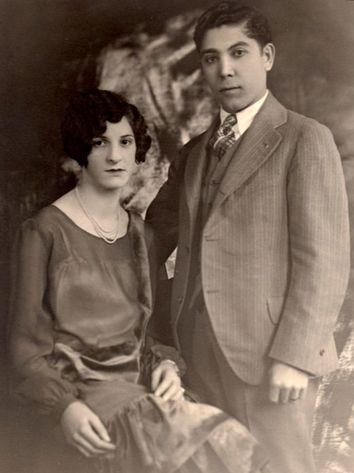 Evelyn Bruno and Ernest Pais, my maternal great-grandparents Evelyn Bruno and Ernest Pais, my maternal great-grandparents I could see that to her, being zingara, was something to be hidden, locked away in a family chest, only shared with one member of a future generation. I rode that knowledge for many years, feeling it in my blood and locating it in my bones. I hope to learn just what that meant to her--beyond the things I've read--by locating and contacting (maybe not-so-distant) relatives and piecing together the family story through photos and oral history, library archives and church records. Whatever the story turns out to be, her fear was palpable. I consider it my responsibility to connect the dots, so to speak, for future generations. So much history was lost in the 20th-century due to war, immigration ("we're in American now, we speak English," my father was told), and simple lack of interest or time. I don't know how successful I'll be, but I'm compelled to follow this path. Through camera and audio, the written word and a little bit of luck I may uncover the reasons they left and why it was kept hidden for 70 years. 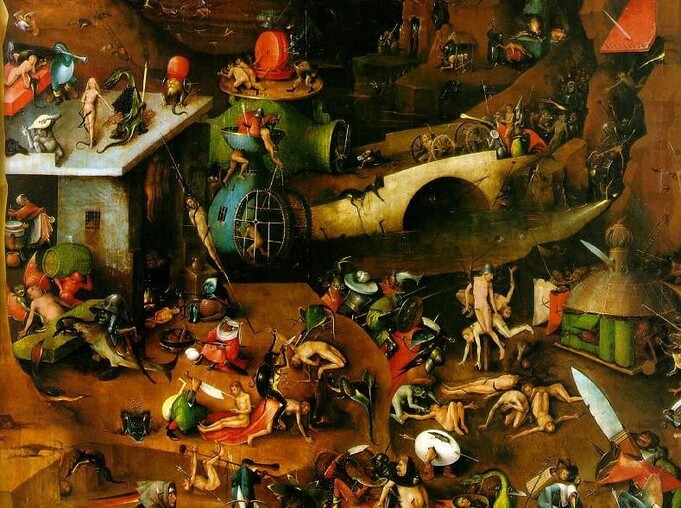 The Last Judgment, 1482, Hieronymus Bosch The Last Judgment, 1482, Hieronymus Bosch Sitting on the front porch this morning, surrounded by rain and warmed with my first cup of coffee, a friend of my daughter walked through our gate obviously upset. I asked her, "is everything ok?" She sat down in the chair opposite me and proceeded to tell me about her recent experiences with the (almost) men in her life. I say "almost" because although they may be men legally, they are, for all intents and purposes, still boys. Or they are very young men who haven't yet moved fully into their male adulthood. Like her, they are in that threshold place, where their bodies are fully developed but their minds and emotional intelligence are still developing. You know, the early twenties. As I talked to her about the challenges of being in a small town, the mating dance, and political history (yes, I'm that kind of mom) she visibly brightened and the conversation ended with her on the couch with one of our cats curled up on her belly. She's falling into sleep that will undoubtedly take her to places where she will do battle with the demons of heartbreak. We've all fought this battle in the dreamworld and lived to tell the tale, but I don't think that makes it any easier in the daily scheme of things. As I sit here in reflection, I drift back to my own twenties and early thirties, remembering the mating dance we all learn through trial and error, metaphorically stepping on the toes of our partners and sometimes (well, maybe more often than that), tripping and falling flat on our face in front of a large crowd. I never did do anything small and inconspicuously although I've often dreamed of it...now I sit on the other side of that dance, not watching from the sidelines, but no longer strapped to the need to breed. Does this feel like freedom? Damn straight it does and it reminds me of a passage from Plato's “The Republic” (1852 translation), which quotes Cephalus: "…I may mention Sophocles the poet, who was once asked in my presence, ‘How do you feel about love, Sophocles? are you still capable of it?’ to which he replied, ‘Hush! if you please: to my great delight I have escaped from it, and feel as if I had escaped from a frantic and savage master.’ " (1) It's important to keep in mind that "love" means "sex" in the ancient wording and although I don't agree with the notion that sex (or love for that matter) are to be escaped but rather enjoyed, I do understand the underlying message: when we are of prime breeding age, we are as if chained to a raging tiger that determines our actions whether we like it or not. And I am so very happy to ride freely when I want, rather than never getting off the damn ride. For thirty-odd years (10,000 days) I was bound to that wildcat and now I can ride when I want and walk alongside her when I feel like placing my feet firmly on the ground. I've actually spent a fair amount of time analyzing the phenomenon of mating and breeding. It really began with my nascent deconstruction of social mores, such as religion and law. In those early analyses I saw clearly that to control the body and its most basic drives--the need for food, affection and other body expressions, the drive to procreate--is to control the individual, lock, stock, and barrel, which is what most religions and laws attempt to do. We are told what is acceptable, what is not, and what you might burn in the eternal flames of hell for doing (as a recovering Catholic, this last possibility was a particularly strong impetus for not questioning the rules and regs. I mean, who wants to be tortured and raped for all eternity like one of Hieronymus Bosch's horrific paintings?). I suppose those early patriarchs needed to make resistance seem really bad, I mean horrific, in order to convince those who had embraced equality and pleasure for ten thousand years that they needed to forget all that and join up with this new misogynist worldview. If we didn't go willingly to our mutual demise, then by god we'd burn, either to death, or in the eternal afterworld. The unfortunate individuals who lived about 6,000 years ago were thrust into a world where women were forced to give up their rightful place as equals and carry the burden of responsibility for everyone's suffering because of their biological make-up. Naturally, they refused to submit to this insanity and the ones who got away fled to distant shores, bringing the ancient wisdom with them, which they passed on from generation to generation for millennia, one that was represented as a snake. The Canaanites/Phoenicians worshipped many gods and goddesses, but premier among them was Astarte/Ishtar, the fertility mother of the fertile crescent. She was depicted holding a snake in each hand. So, naturally, this new "devil" named lucifer had to take the shape of a snake. This story has repeated itself for almost 6,000 years and each time the goddess was forced into submission, the hatred of the sacred feminine morphed into self-hatred and torment. The one male god is egotistical, if not downright narcissistic, and requires absolute submission. How in the hell else do you force people to deny their very natures? Their very DNA? We share 98.7% of the same genetic make-up with our closest cousins, the bonobos (Pan paniscus) and the chimpanzees (Pan troglodytes); according to some studies we have more in common with our bonobo cousins. From the Primate Fieldnotes (2): "Based on 54 gene regions, Homo-Pan genetic distance range from 6.92 to 7.90×10−3 substitutions/site (P. paniscus and P. troglodytes, respectively), which is less than previous estimates based on large scale sequencing of specific regions such as chromosome 7. In other words, bonobos appear to share 12.4% more DNA in common with humans than chimpanzees do. This is more than twice the genetic divergence in squirrel monkeys (genusSaimiri) and adds further evidence suggesting that bonobos are a better model for understanding our common ancestor than chimpanzees are." The primary differences between our two closest cousins are that bonobo communities are matriarchal where sex is free and open to all; chimps use warfare to settle conflict and only the alpha male can mate; female bonobos create strong emotional bonds, which they use to maintain social dominance over the males and have generally peaceful communities. Chimps keep rigid boundaries over their areas and will kill other chimps to uphold these boundaries, where bonobos will mate, even across borders, to keep the peace. Chimps use tools and bonobos don't (at least not in captivity). Taking these differences--and our genetic similarities--into consideration is a compelling thought game, don't you think? If we combine this biological trajectory with, for example religion, we can see the chimp and the bonobo behaviors play out historically. This is particularly appropriate for the patriarchal monotheisms, such as Christianity, Judaism, and Islam and their stories of war and male dominance. It's as if they are the human evolution of the chimp, whereas those religions and cultures, both current and historical, that recognize the goddess or some other form of the sacred feminine could be seen as descendants of the bonobo. Let's keep in mind that this is my attempt at understanding just how we could have evolved into a world of war, male dominance, and militarization on a biological level. Obviously capitalism and a hoarding mentality play into this equation, but personally, I see these two things as simply other expressions of the original quandary: why do we ignore our biological nature? First answer: because male dominated religions have forced us to ignore our primal urges and needs in the name of piety. Second answer: perhaps our split off the evolutionary branch from our closest cousins, the bonobos (this happened about 2.5 million years ago, they then diverged from the chimpanzees around a half million years after that (3)), included enough genetic material that humans brought a predisposition for one or the other with them... So, I figure some of you are thinking, what the hell is she talking about right about now, I thought we were talking about love and mating, but ride this mind wave with me because I just know it's leading somewhere that might give us a way to deal with heartbreak. The way I see it is like this: we are animals, primates to be specific. We send out pheromones when we are of breeding age, we breed to carry on the species, it's like a built-in, biological imperative. Not all humans need or have a desire to breed, but about 75% of the world does so on a regular basis. Those who have seed to share, often do so generously, or feel compelled to, and some do not. Let's keep in mind that those little swimmers aren't the most resilient human, albeit infinite, product, so it seems an evolutionary step to manufacture and release as much as possible, "knowing" that their survival rate is pretty slim. Those who are born with a finite number of repositories (about 1-2 million) for that never-ending supply of swimming genetic code, can generally only make one at a time (sometimes two or three). In addition, once born, the small baby humans require constant care as they are utterly incapable of survival without it. This basic biological process has been twisted and humans made to suffer at the hands of a warped worldview that is hell-bent on controlling this simple biological process in the name of power and greed. If I consider my own history as a sexual being, particularly in my 20s, I had absolutely no desire to breed and often "broke hearts" because of it. But I honestly believe part of my strong libido was tied to an unconscious desire to do just that. I can only say this now that my body's breeding phase is complete. I watch others and I feel as if I'm reading a book I've read a hundred times before. How many times have I heard individuals say, "I thought it was more than just sex" when it felt that way for a brief period and their partners saw it as "just sex." How much of that dynamic is socially constructed and how much is a biological drive? How would we react if we hadn't been convinced very early on that lifelong monogamy is natural? Perhaps the breeding drive would run its course and then we would move on, sharing a safer, warmer, and stronger community for having shared the process--like our bonobo cousins. Maybe the notion of "love" is a social construction based on the need to breed. Perhaps some humans have a predisposition for behaviors that more resemble our chimpanzee cousins and others like the bonobos. Or maybe some people mate for life, like some animals do. Perhaps it's an individual combination of genetic code and social conditioning that is as unique as each person. But what do I know? Not much really, but I do believe that more sex and more love will get us to a place where we might understand it all better and return us to our original selves. I am absolutely sure the insecurity created by religion (and advertising for that matter, but that's a whole other conversation...) is something that must be deconstructed by each person, male or female, in order to return to a more authentic human experience. ...to be continued A letter to my kids. It's hard to let go. At least initially and when trying to live a life that's from the heart. I've been learning about this balancing act, and it's much how I imagine surfing to be. Not that I've ever surfed; I really don't like being limited by finite edges, but how I imagine a liquid floor moving with good force might feel. And this transition is happening at breakneck speed, inclusive of everything around it, washing away all that no longer serves; pulling new and exciting things on to shore with it. Yes it all feels a bit like standing on the beach edge, rather than a nest in a tree, but the elements of water and wind are all at play just the same.
I am nearly what is often called an empty nester. My kids are close in age--17.5 months apart--and both are flying out to meet their individual air currents and ride them with what I hope is vigor and excitement. This is, at least partially, built into the parenting experience from the moment you lock eyes for the first time. Between that moment and the one when they say, (verbally or in action) "I'm ready to fly," time happens faster than anyone can prepare you for. Not that there weren't days between that seemed to last forever. Moments that were so difficult that I was a crumple of tears and exhaustion. Moments when nothing, absolutely nothing, mattered as much as a free minute to simply sit alone. I heard people say that it goes much too fast, but in those moments I didn't believe them. How could I? Breastfeeding two at the same time, having two in diapers, the constant focus on food preparation...well, it was all a little much at times. But there are times now when I would gladly go back and allow myself to just sit and marvel at them, as I did more times than I can count. Watching them create wondrous worlds out of wooden spoons and blankets or laughing with them over something as simple as dust particles floating in the rays of the summer sun. These are the things I think of now. The difficult moments were few in comparison to this rich, sensual world of new wonder. My two have always been forces of nature; each has their own (and often quite disparate) ways of interfacing with the world but both shine with lights so strong, I am left no choice but to love unconditionally and try to guide as best I can. I'm glad I waited to have my kids. I also wish I had started earlier because I'm not sure I can measure the deep changes the experience of motherhood has instigated. These reveal themselves at odd moments and catch me a bit off-guard with their simplicity. Some of the changes are the result of making the wrong decision or having the wrong reaction in a given situation. I've made mistakes. It is my deepest hope that in those failed moments as a mother I did not cause irreparable harm. I've tried to learn immediately from whatever it was, never repeating them; more often than not I think I was successful at internalizing the lesson. I have also caught fleeting glimpses of their strength and clarity, obvious reflections I have taught my kids and that is a holy mirror no one ever talks about. I see them relaxed and comfortable in a world where fear and competition are commonplace. A world where shame forces people to act in secretive and dividing ways. Rather than create a false image of the world, I have tried to be honest with them. Rather than create a false image of myself, hiding the many-colored cloak I wear, I have worked to help them see we are all a work in progress and to never stop learning because, to quote a much-quoted Dylan, "he not busy being born is busy dying." I have tried to teach moderation because it has been my hardest lesson. Not abstinence, not purity, but responsibility and enjoyment. I've worked to separate social mores and rules from natural impulses and ingrain a deep knowledge that most of what we're expected to do or say is based on a dying paradigm that uses emotional and physical force to get what it wants. I needed for them to know this, to understand that they will be surrounded by those who will try to break their spirit, but not in our house. Our home has always been free of the social constructs that American society bullies its citizens into believing. Not that I haven't had my demons to smite when certain situations came up, but thankfully I had enough years on my own in the world to have fought many of these battles without the trusting and hopeful eyes of my children watching me. I have come to see that the hardest part of letting go is trusting that we have done our job as parents. Trusting that we have loved them enough in the way that nurtures them individually. Trusting that we have taught them enough so that when life steps up with a sucker punch they can bounce back and walk away or fight if necessary. Trusting that their inner fire is strong enough to light their way when they are afraid. I believe that many loving parents simply do not trust themselves or their abilities in the world, but rather than acknowledging their own lack of self-belief, they blame a scary outside world or, more egregiously, their own children for not being good enough or focused enough, or some other tangled web of a thousand fears that drive some parents to control every aspect of their child(ren)'s lives. I'm not saying it's easy. It's fucking hard as hell to let go of the reins. But it must happen and when a child shows the first sign of pulling away. They will fail at times, they will falter and possibly make profound, life-altering mistakes, but such is the nature of free will. I used to say that my parenting style could be compared to having one of those retractable dog leashes. My kids could walk out as far as they liked (metaphorically speaking), but were still attached and I could reel them back in if imminent danger was around. This worked well until they learned to take the collar off altogether. That's when trust in myself became the center point in my internal dialogue. And that's when the tests began in earnest. Both astounding and terrible choices have been made by them and there were days in the recent past when it took all I had to stay the course, or to continually advocate for them in a sea of conformity and mediocrity. And now here we are, all three standing on the edge of the nest looking at the future. I want them to fly strong and as far as their wings will take them. I also want them to be little kids again, lying all together at bedtime, with me reading aloud to them. My son always fell asleep first (well, he was the youngest), so we would all scrunch in on his bed. But my daughter often asked for, "one more chapter!" And I enjoyed it so much that away we'd go on a train to Hogwarts or observe Paris from behind a giant clock. I did my best to protect them from commercialization and a focus on consumption when they were young so no television at our house, although we rented movies from our local video store that sold bags of popcorn for a quarter. We must have seen every Godzilla movie ever made at least three times. I suppose the scholar in me studies almost everything in my world, so I've conducted informal longitudinal research that has looked at child development and I've observed that the kids who grew up watching television believed they were always being watched and that the world is a scary place. Additionally, these kids have also grown up to very often have body issues. A plain and simple cultivation theory, Mr. Gerbner, in living color. So we all spent as much time as possible outside, playing in the mud or hiking or climbing or making art...things that made them strong and unique. Summer days running around naked, all tan and healthy...yes, those were all-consuming and (mostly) wonderful years that I will carry with me until I go, like they happened just last week. But that is the past now and today I am here learning how to balance in the act of letting go. I'm moving out into the world on my own again and it's both exhilarating and hard to not wish for a chance to do it all again. I enter this next chapter of my life with a renewed sense of self and an excitement I haven't felt about me, myself, and I--excitement that's not focused specifically on my kids or their successes--since crossing the threshold of motherhood. Not everyone who has shared in this passing chapter are by my side as I move into this new place and I'm thankful for their influences along the way. May my friends who have gone their own way be happy in this next phase and may my kids be filled with love and pleasure as they fly into the great unknown.  I just recently started watching a television show on Netflix, a Revolutionary-era story called Turn. It's not the best show--it's not The Wire or anything--but it has got me to thinking that very little media has been focused on this era of American history. Even when I was a kid, not much information was passed on or talked about, as far as the collective historical archive goes, about this war. Why is that? Why would we spend so precious little time learning about this story when American History (with the capital H) tends to love congratulating ourselves on our war "victories." All thoughts seem to lead to the same conclusion: it would not serve corporate interests to promote the ethos behind this war. The war for independence was part of the Enlightenment wave, a period where individuals rose up and challenged the years of absolute control of the ruling class. Well, they challenged it conditionally, as it really only applied to certain folks of particular shades and with particular genitalia, but the thought process was started and it swept throughout the colonizers' lands. In truth, the treatises and philosophies written during those years (1650-1790ish, although I would go so far as to suggest that November 5, 1605 was the stalled beginning...), earned their name "enlightened" and had they actually been enacted--as written--they could have become the Utopia many wrote of. Unfortunately, as only a portion of the world's population was permitted to live in this enlightened realm, it was doomed to failure. There were, however, a couple of historical moments that stand out as truly challenging the dominant power structure of the day; one of those being the topic of this little missive, the war for independence for the 13 North American colonies (and, for the record, "America" should have stopped there and peace made with the First Nations people for this trajectory to have fulfilled itself, but due to the partial application of its basic tenets it was doomed to recreate the actions that had originally led them to leave their homelands in the first place and, ultimately, to failure). As they say, absolute power corrupts absolutely. In any event, this rumination is not so much about a Revolutionary War lesson as it is a reflection on the strange historical blackout that is that particular war. We have in many ways returned to a similar social place, in a mere 239 years, as those in power tend to control the means of force (and the streams of media that educate the masses). If the Ideological State Apparatus* (ISA: schools, churches, media) doesn't work, those in control will always rely on the Repressive State Apparatus (RSA: government, police, courts). This is precisely what the British brought with them (and please let's remember these British tended toward the Puritanical, thus a certain sadistic pleasure was derived from denial and punishment) and it has been an ingrained part of American Society ever since. But there was a time...a time when the ideals and values of the Enlightenment inspired thousands to fight against tyrannies and strive for a more egalitarian social order. Indeed the television show, Turn, tends to focus clearly on this aspect of the war. And so, since happening upon this program, I have begun to reflect on the absence of education in schools and the media regarding one of the driving forces behind American independence: "We hold these truths to be self-evident, that all men are created equal, that they are endowed by their Creator with certain unalienable Rights, that among these are Life, Liberty and the pursuit of Happiness.–That to secure these rights, Governments are instituted among Men, deriving their just powers from the consent of the governed, –That whenever any Form of Government becomes destructive of these ends, it is the Right of the People to alter or to abolish it, and to institute new Government, laying its foundation on such principles and organizing its powers in such form, as to them shall seem most likely to effect their Safety and Happiness." Declaration of Independence (excerpt), 1789 [italics mine] We have largely forgotten this foundational tenet in our Declaration of Independence and I believe that is more than partially due to the fact that we have returned to a repressive social environment much like the days when Americans-to-be rose up against the king and threw off the shackles of an unhealthy system. Our king is now Citizens United, corporate personhood, and a consumerist mindset that keeps us enslaved to the machine. How will we deal with it this time? And that time is coming quickly, at least growing recognition of the ISA in the social control equation: people are waking up from a long, dark sleep (thank you Assange and Snowden) and the #BlackLivesMatter and the growing popularity of Bernie Sanders are bellweathers for this. What I'm not so sure of, or perhaps where my real fear lies, is in how long till the RSA kicks in on a mass scale. Being of an age so that The Terminator (the first one of course, not the franchise) captured the zeitgeist of my personal root fears, a Skynet-type monster computer in control, crushing human skulls under metal feet...now the machine is captured by iPhones across the globe, exposing what's always been there, was in fact transplanted here along with white supremacy. Strange fruit indeed...this leads me to wondering just how far they'll go to keep control. A very insidious example lies in the fact that we learn almost nothing about the history of our fight for independence and it serves the interests of those with power to distract us from remembering; pharmaceutically medicated in order to fit into narrower and tighter spaces. Through remembering we might draw connections that would gather us together in common realization that our enemy is not one another, not color, not religion, or gender but is that which seeks to control human impulse and natural order. That which has created seconds and minutes and hours and a notion of time beyond the movements of the sun and moon. It's funny to me how science--the great precursor to the Enlightenment--is working to figure out how time and space do not work in the regimented second-minute-hour-past-moving-to-future framework we've come to function under. Because you can't punch a time clock if you can't measure time in segments, hence you can't count hours or pennies or millions. It's all wrapped up in a notion of profit and ownership and THAT is what must be retaught to the people. By cracking that shell, by speaking up and challenging the things that are so ingrained in our quotidian lives as to have become mythology, by creating open source media that start an internal dialogue and lead to a realization of our roots, we encourage the tide to Turn. Do it now. *Louis Althusser, "Ideology and Ideological State Apparatuses," 1970 Of all the things I learned while on my recent all-too-brief 3 week trip to Egypt, one particular factoid stands out. When building the (second) Aswan Dam in 1970, all the crocodiles in the river Nile were herded into Lake Nasser, the massive reservoir of water created by the dam. Some 90,000 Nubians were forced out of their ancestral homes as a result of this construction, as were ancient statues, temples, and monuments. Let me backtrack. As I was walking around the smallish area known as Abu Simbel, where Ramses' incredible (yet egomaniacal) homage to himself had been moved before it was flooded by the creation of the lake, I asked our guide for the morning (required part of the ticket cost) why no one was swimming in the gorgeous lake. And it is gorgeous, feeling more like an ocean right in the middle of the desert, it creates a coolish breeze that blows across sun-baked skin that is mostly covered as a courtesy to the women who are fully covered. The guide laughed when I asked why no one was swimming, "No, no, no! No one swims in the lake!" "Why?" I asked. "Too many crocodiles!" Then I laughed, "No!" as I scanned the lake from west to east, not seeing the slightest sign of crocodiles, or of any life really. All I could see were rocks, sand, and water. He then proceeded to tell me that when they built the dam, they forced all the crocodiles from the entire length of the Nile, from the Delta in the North to Lake Nasser in the South (known as "Upper Egypt" as the Nile flows down to the Mediterranean delta) into the giant desert pool known as Lake Nasser. Think about this a little. How long did it take? Just how did they do it? Were there transgressors? Did people put up a stink? Were there deaths involved? I can imagine that it made life easier along the banks of the river, especially for the boy children who are allowed to swim in the river. And what of the Nubians? Forced out of their ancestral homes, much like the Navajo in this country when the Glen Canyon Dam was built in 1966, the Nubians have adapted to their new communities, but as I spoke with them in the Nubian village of Gharb Sihell where I stayed, there was a very clear upset still quite visible when they talked about how they have less water now and have had to leave their homes. Why do I relive this conversation and factoid over and over again? I wake early still (4:30 am seems to be my internal Egypt-America alarm) with thoughts of crocodiles being chased and caught and forced into their sterile home of the lake. They are yet another population that has been forced to moved by the whims of men; "We Can So We Will." The implementation of these technologies is always at the expense of someone and for the profit of others. From a child's information site: "The Aswan Dam generates up to 10 billion kilowatts per hour of hydroelectric power. This is enough electricity to run 1 million colour televisions for more than 20 years" (1). Nice to know that this unnatural dam construction can power 1 million TV sets for 20 years, right? The real issue is that the dam has also stopped the annual flooding of the Nile, and this has prevented the river from depositing nutrient rich silt onto the traditionally flooded areas--and when I say traditionally, I mean thousands of years of traditional stewardship of the land. It takes 40 years to cripple thousands of years of human-land learning and agreement in sharing and prosperity. Mind blowing. Sitting in the dark as Oum Kalthoum's voice wafted in the soft wind and one of the 3-4 daily blackouts rolled through our El-Souk alley, I asked one of our gracious hosts why Egypt wasn't the leader in solar power, seeing that the entire country is desert and sun. He informed me that the government has begun to look into the infrastructure needed to make this happen. I said that if Germany can do it, Egypt could do it. I see now that the lag in technology, for a country that is born for solar power, lies in the crocodiles and the dams. The dam was designed by the British and constructed by the Russians and it has created hydroelectric power and a steady flow of water to the 97% of the country's population that lives along the banks of the world's longest river. The city folk have adapted to things like rolling blackouts; shops and cafes simply turn on their generators and the people working see it as break time. It's those who work the land who feel the disappearing and much-needed river nutrients. As is often the case, the colonizers determine what will or will not be and, personally, I see global dam construction as being of an era when white supremacy ruled and all others were at the mercy of these powers. As the dams come down now I wonder how we will talk about them and the lessons learned in the future. While I was in Bahariya, one of the five Oasis villages in the Western Desert of the Sahara, I was told that they hadn't had a drop of rain in 25 years. 25 years. The only reason villages exist there is because the area is a geologic depression that formed an aquifer below the surface. So, in the middle of a 25-year drought, palm and dates, and mangoes and oranges grow all around. The air temperature at the lowest point is downright cool at night. Once the government makes the shift to solar, Egypt could make enough clean energy to support itself for another 10,000 years. 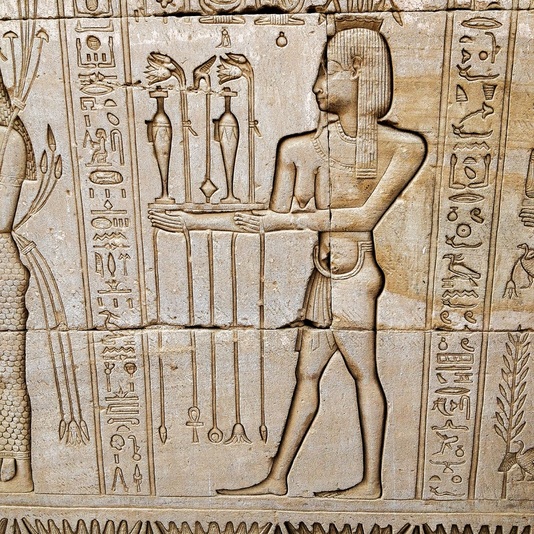 Hapi, the god of the flooding of the Nile. This flooding provided fertile soil in an area that was otherwise desert, and as its patron, symbolized fertility. He had large female breasts because he was said to bring a rich and nourishing harvest. He was considered to be a caring father who helped to maintain the balance of the cosmos, the world or universe regarded as an orderly, harmonious system. This included the crocodiles. Hapi ain't too happy right now. Who am I to say? I was smitten with a world so very different, yet so much like, my own. Kids are kids wherever you go and so are mothers. I was honored to have spent time--unveiled time--with women living very different lives to me, but when we got down to it (through our wonderful friend Soad who acted as interpreter), mothers have the same concerns and worries no matter what they wear on the outside. The times spent with women were the most relaxed, although it seemed to me that men thoroughly enjoyed socializing with women and I enjoyed these times immensely. Very seldom did socializing involve both men and women, so I was often moving back and forth between the two groups. In some ways, it's easy to comment on a culture of which we are not a part. I find it difficult with Egypt, perhaps because I'm still processing. I guess that part will come later. Today, I think of the Nile and the crocodiles, Hapi and the Nubians. Eka Dolli means "I Love You" in Nubian and was the name of the guesthouse where I stayed in Gharb Sihell. I was very comfortable in this part of Egypt, where it was clean and everyone moved at a pace in keeping with the sun. No forced marches here, although the building of the Aswan Dam in 1970 was one giant march from northern Sudan/southern Egypt and the location of Lake Nasser to their new locations now on the West bank of the Nile from Aswan and Elephantine Island. Those in Power Could So They Did. The whims of men that alter the perfection of nature eventually fall away and then the rivers, crocodiles, and humans might play as they did long long ago.
Eka Dolli Masr.  For the record. Since so many have been teasing me about my "pope romance," I thought I'd take the time to clarify my stance. I do not support the Catholic Church but I do support its demise. If Christ ever blessed the Middle East with his wisdom it is long lost to the men who used him for control and dominance. We--and by we I mean all humanity (although in particular women and people of color)--have been suffering through years of misogyny and the worst kinds of unnatural suppression in the name of enlightenment. It started with the early Roman bishops who decided to create a "church" and it has morphed into different forms since that The First Council of Nicaea (325 AD). This religion (and all subsequent ones that align with "christian" doctrine) has rejected the goddess and her earthly representations and is therefore inherently flawed. This basic lack of balance has wrought unspeakable horrors and suffering upon the world, including a pigheadedness that will kill in the name of this imbalanced "male" god in order to prove righteousness and to silence opposition. When it jumped into bed with with the fledgling mercantile class in the mid-16th century...well, things have been seriously lost ever since. So. Why I do I like this new pope? Because he is shining a light on some of these things (christian hate, rampant greed, etc.) and, in turn, dismantling many of the largest hypocrisies of the church (like poor=inadequacy of the individual rather than a systemic failure). To someone who considers herself a recovering catholic, having seen this hypocrisy of the institution she was raised in, I welcome anyone or anything that challenges these lies. I see this in the first Franciscan pope who is incorporating liberation theology (long a South American catholic practice) into Roman catholicism. And, c'mon, who doesn't like St. Francis of Assisi and his hippie ways? Do I think his election as pope is a PR move by the vatican? Probably. I can't imagine that they'd do this if it weren't on the heels of the staggering number of children coming forward as adults in solidarity to name their priest-predators of sexual abuse. The vatican needed a make-over. They picked Francis. Do I think he will make lasting change? Maybe. I do think his moves are in alignment with the wave of awareness washing over people in general. So, go ahead and tease. I'll laugh, too, since it really does seem out of character for me to say or do anything positive about the church. But I support what I've seen so far...hey, change can come from the strangest of places sometimes... |
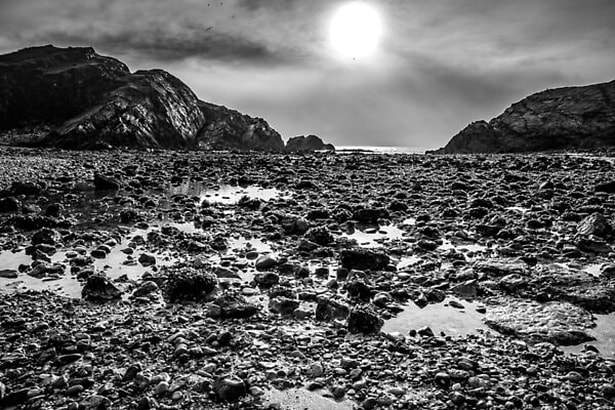
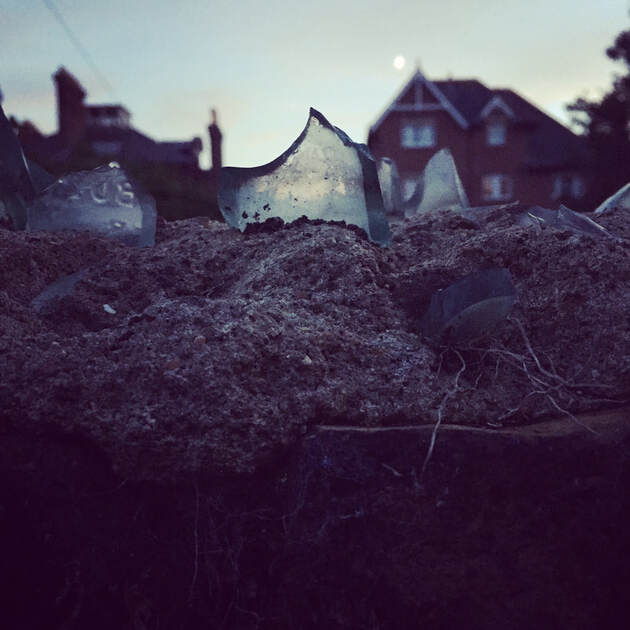
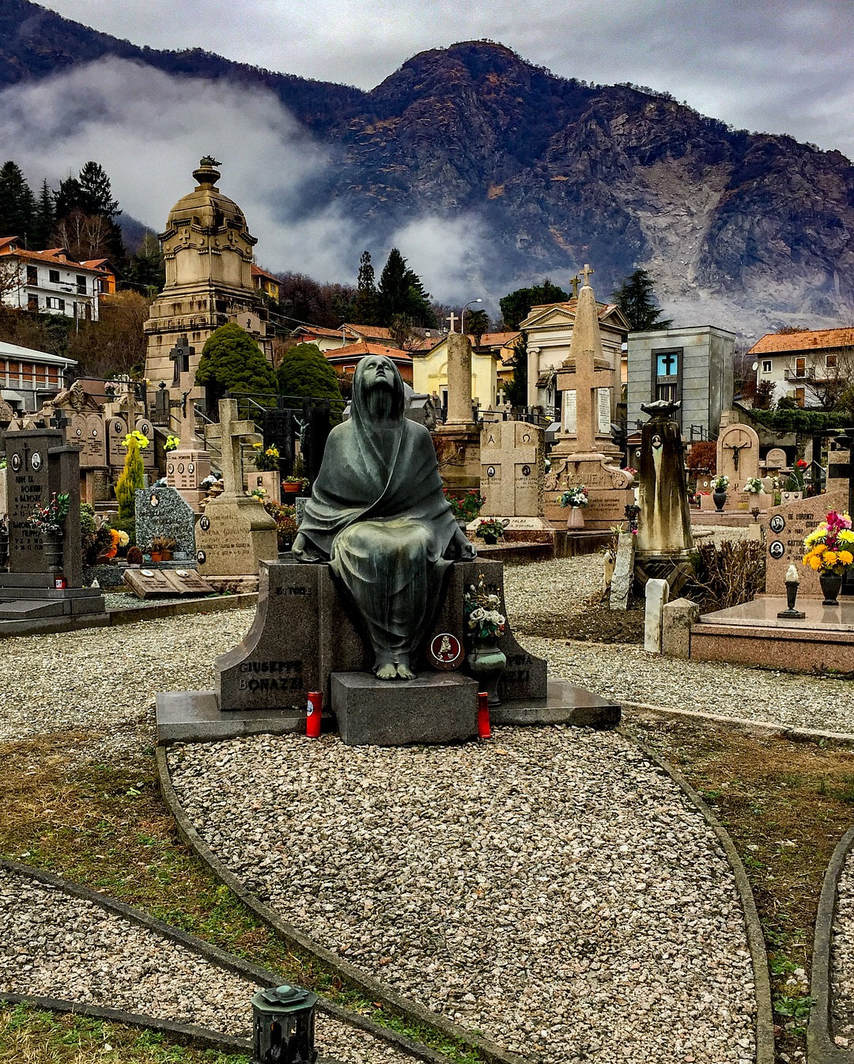
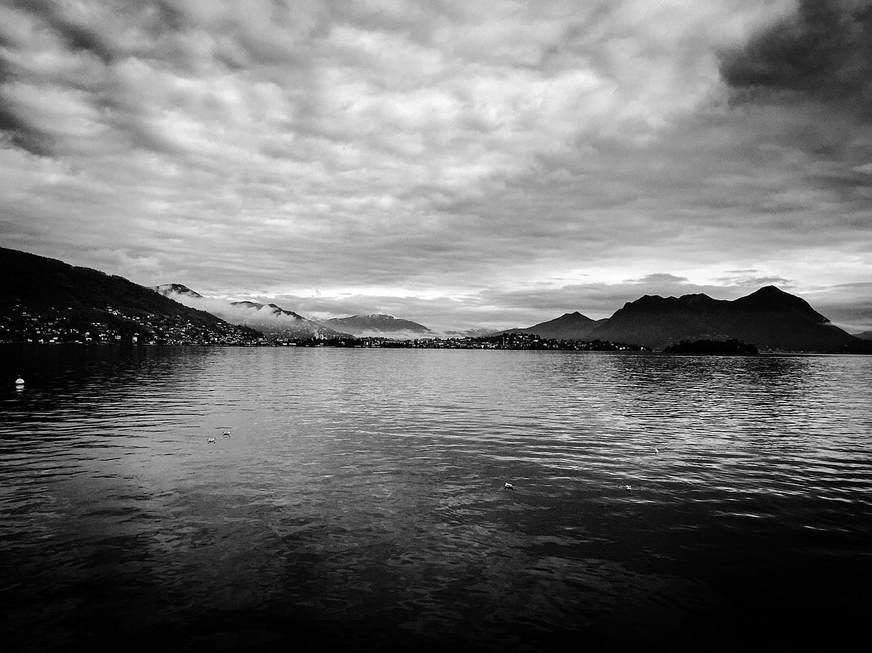
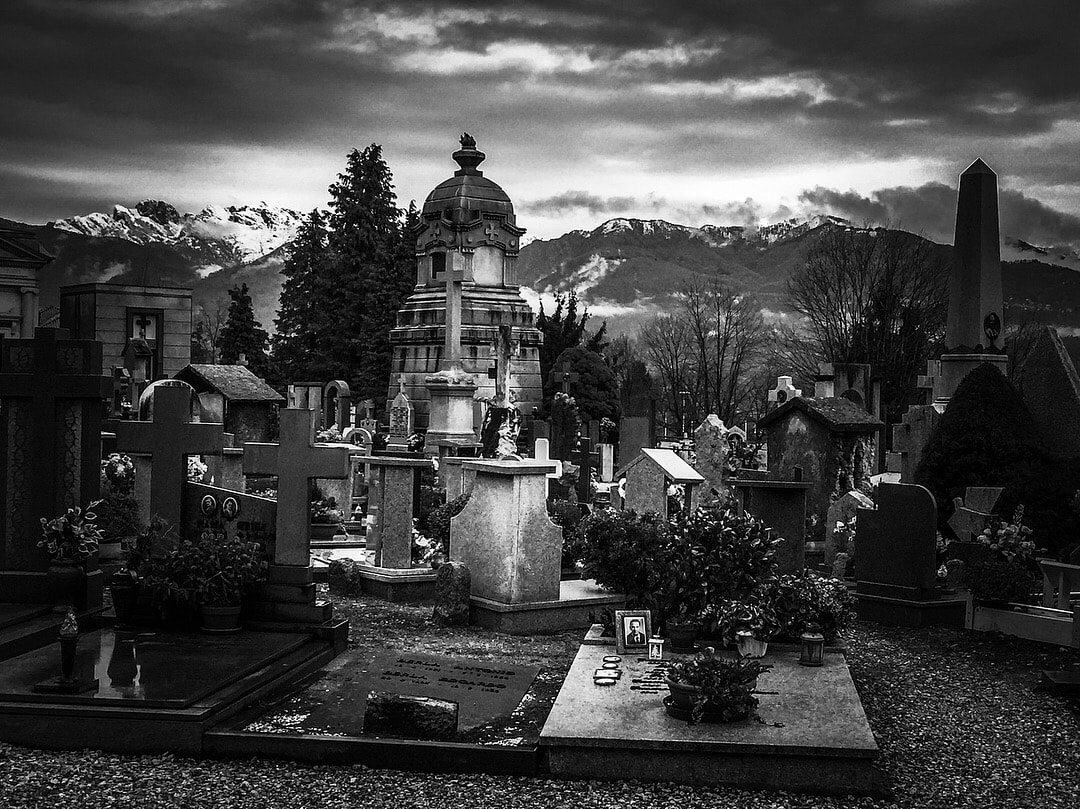
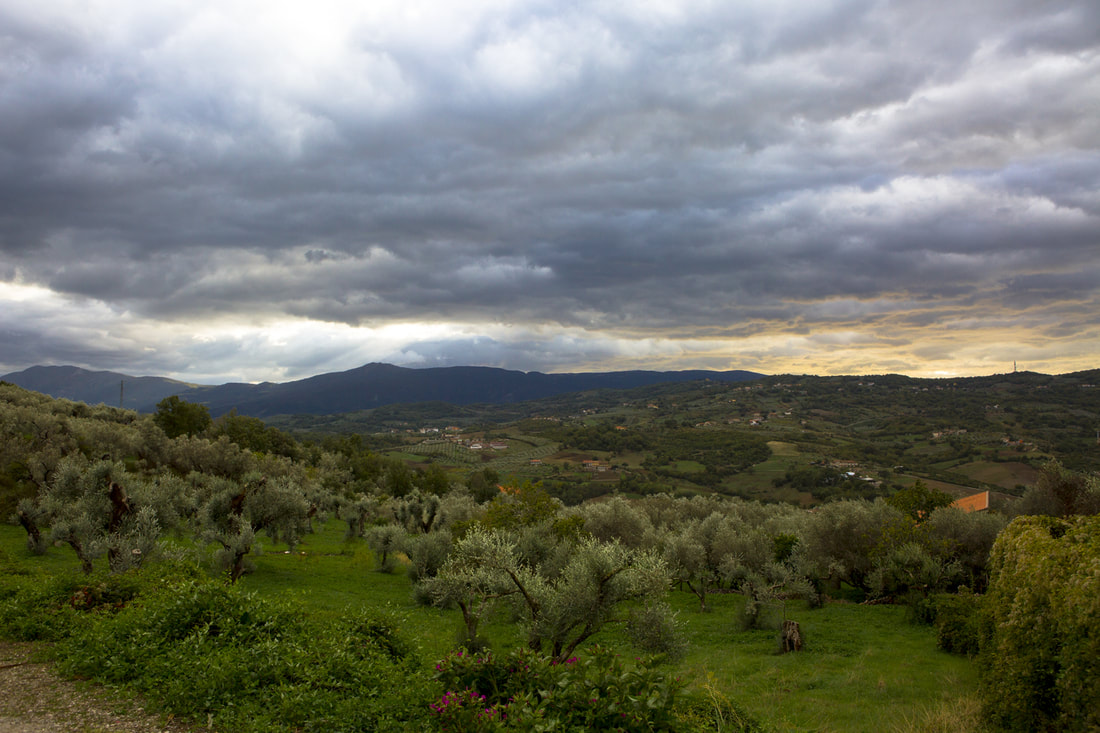
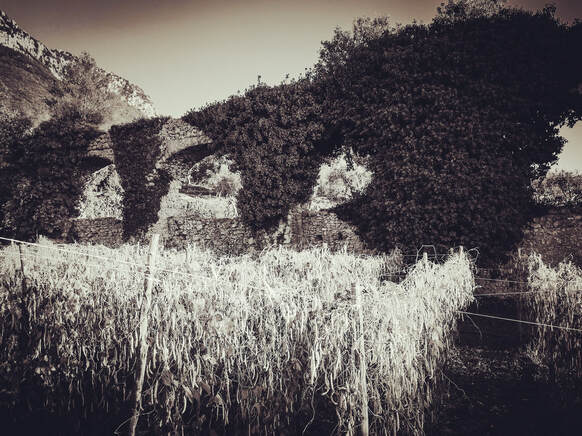
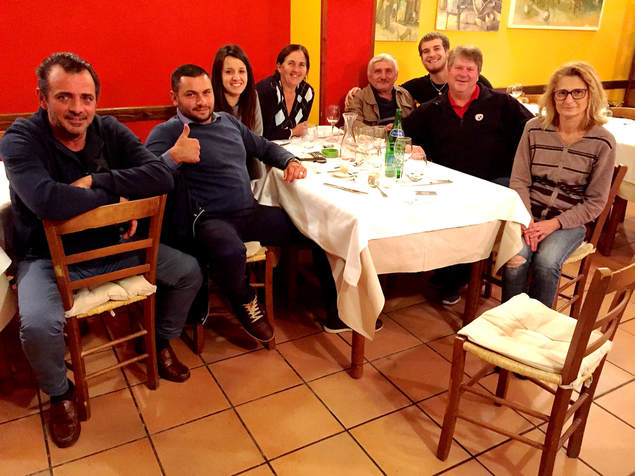
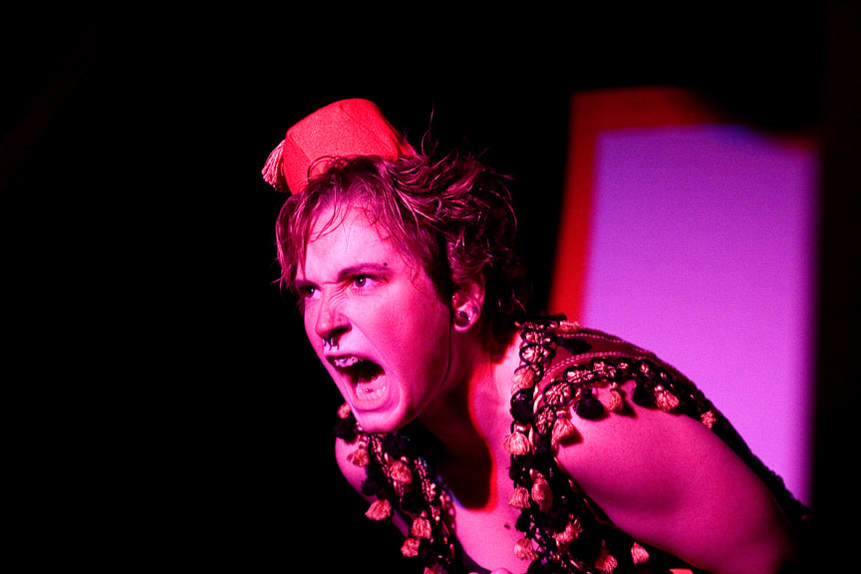
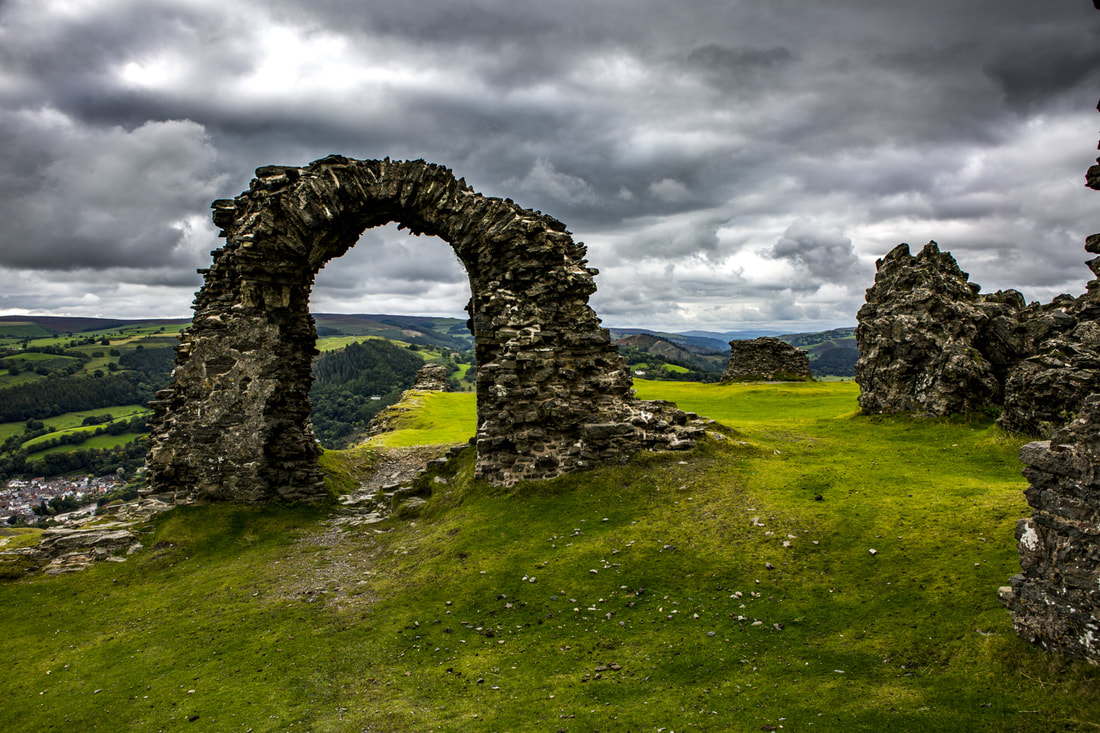
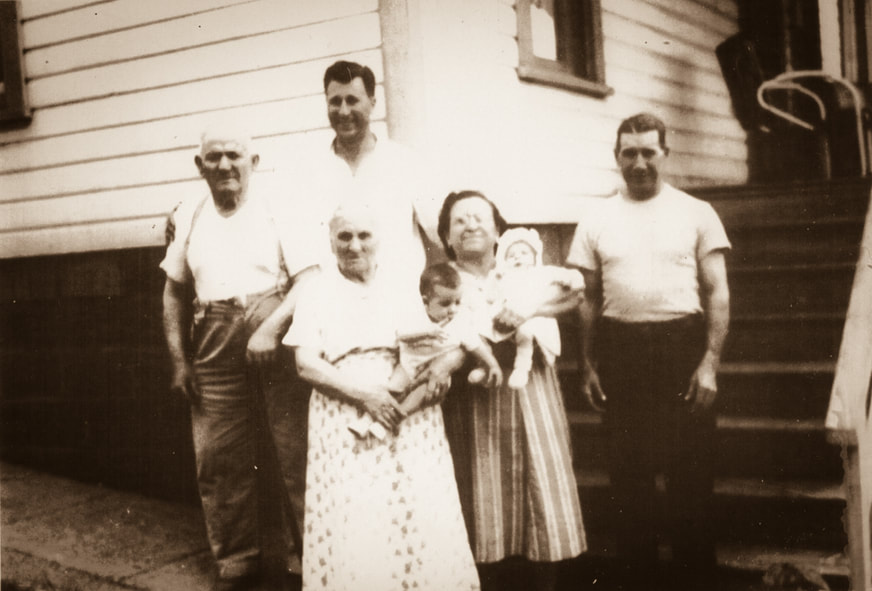
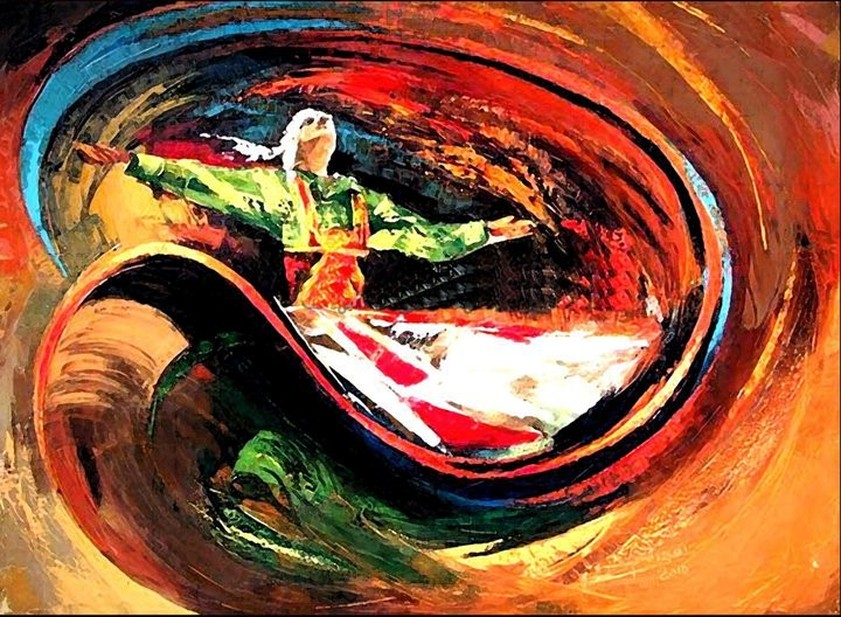
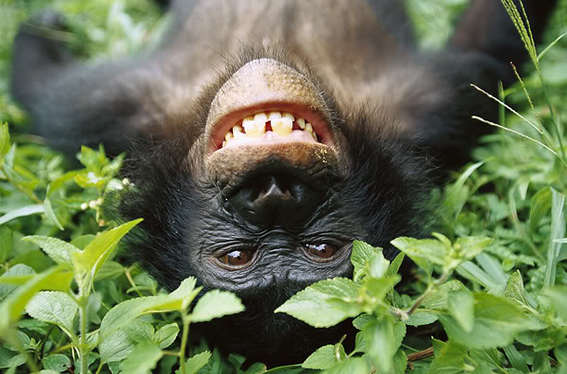
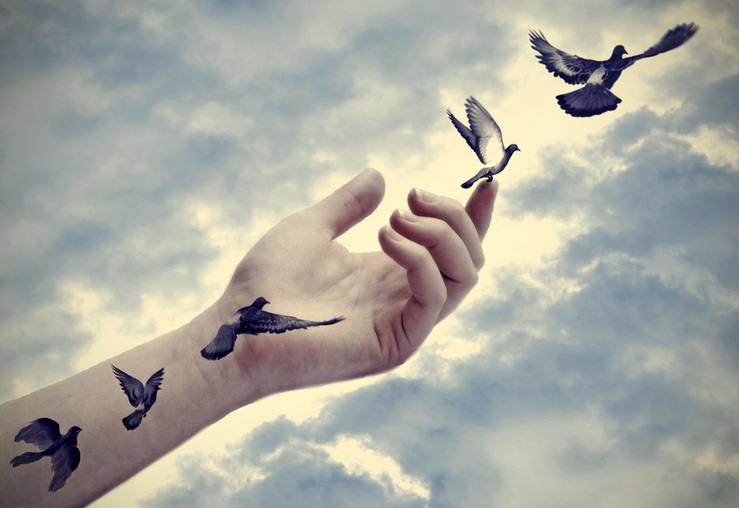
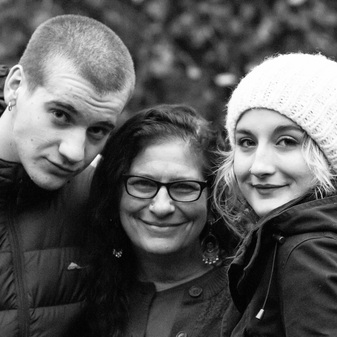
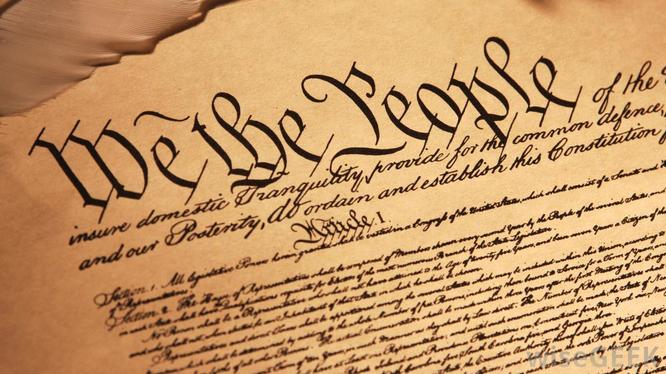
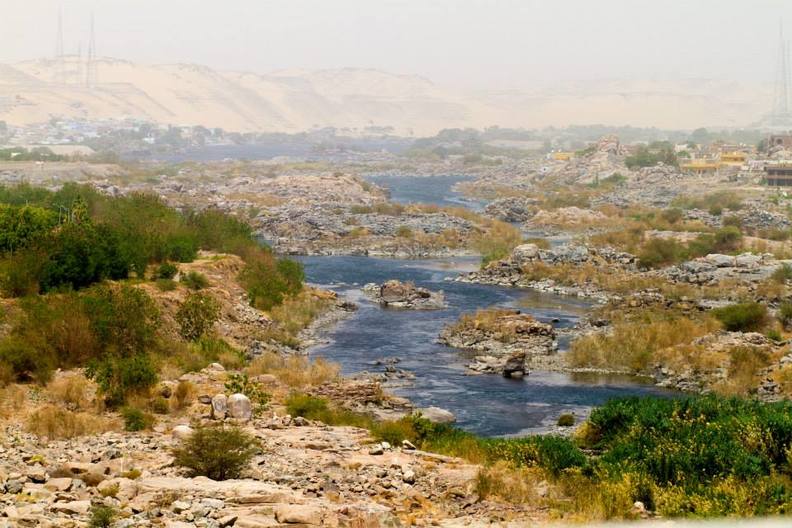
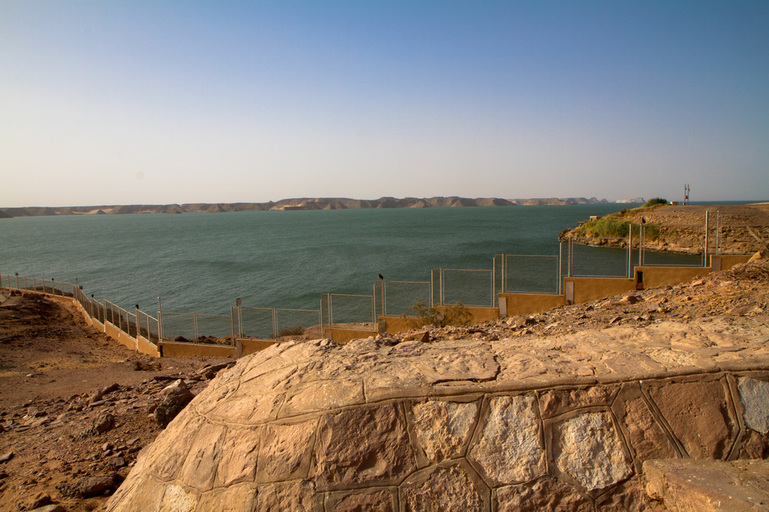
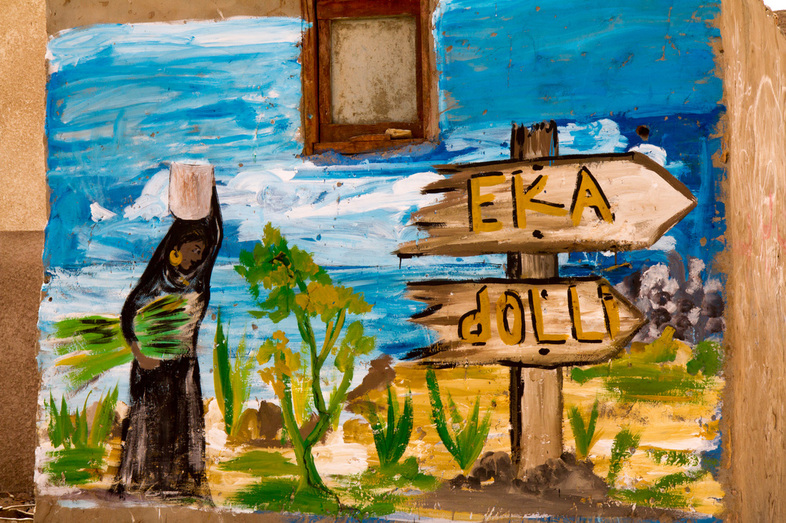
 RSS Feed
RSS Feed